#the answer to that is numerous very interesting and historical things..... but that's for another time
Explore tagged Tumblr posts
Text
Headcanon that the current Solemnace crew all have Waist Inventory™, taking after their overlord, who still carries his curios in this manner despite also having free access to such things as dimensional pockets and tessarect labyrinths. We know the Huntmaster canonically carries his trophies like this, and since Sannet apparently fashions his writing implements out of his own necrodermis, it doesn't sound too far-fetched that he might keep field notes and the like in a similar fashion. Ashkut could have a chronomancer prod there or something. The possibilities are endless
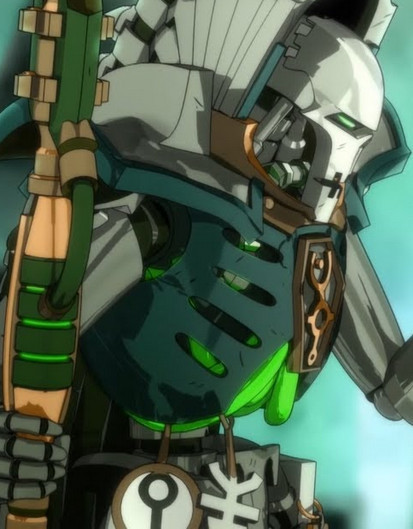
I bet he'd be delighted by the concept of a fanny pack
#warhammer 40k#wh40k#trazyn the infinite#huntmaster#necrons#necron#sannet#ashkut#solemnace crew#hammer and bolter#thinking of him with one of those rattling around his waist all the time 😌#was writing an unrelated thing about what necrontyr scribe!Trazyn might've kept in his pockets on the daily and my mind went to this#the answer to that is numerous very interesting and historical things..... but that's for another time
141 notes
·
View notes
Text
In this post, I'm going to tie numerous observations on screen together to make a single season 3 prediction
it relies on this premise, which i'm about to build a case for:
the way the characters interact with the story is informed by the mythical/historical figures they are directly and indirectly coded as, but it’s not always in the way you’d expect, and some characters are coded in more than one way. we can still use these relationships as Clues to postulate where the story might go and how the characters will interact with one another.
this is by no means exhaustive, obviously. i’ve seen people say that Crowley is coded as Jesus, Aziraphale as Mary, and numerous other figures. i’m just pointing out some things i’ve noticed that I haven’t seen brought up as often.
we’ll start with Crowley, then go on to Sandalphon and Saraqael, then Gabriel, then Aziraphale. yes, it'll all lead up to something and i chose these characters in this order for a reason.
Crowley
so we obviously know he’s coded as Ashtoreth when he dresses up as Nanny Ashtoreth in season 1. yes, we will note that in the book, it’s very vaguely implied that Crowley and Aziraphale both hired Ashtoreth and Francis
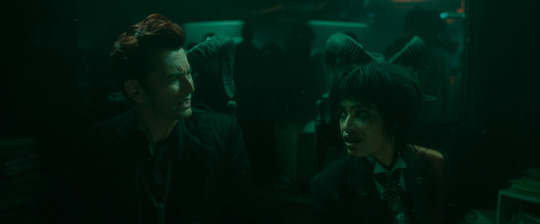
in season 2, when trying to get the deets on bae, Beelzebub offers Crowley a “hefty” promotion and then later tells him “you could be a duke of hell".
in researching Beelzebub, at some point I found out about Milton's Unholy Trinity in Paradise Lost, which includes Lucifer, Beelzebub, and Astaroth as the first heirarchy in Hell, and which has (seemingly) lent that idea to demonology in general.
Astaroth is often referred to as the "Great Duke of Hell."
so now with season 2, Crowley has been coded in the show as both the feminine and masculine demons derived from the eastern goddess Astarte.
note: coded != Crowley is literally Astaroth/Ashtoreth. it means we can infer things about the story through the coding
the obvious would be him becoming a duke of Hell somehow in season 3. i personally am not convinced the story will take that route, and it would be sad to see him end up back in hell. this coding is the least compelling for me. it could just be a Milton reference, or maybe, since at this point in season 2, we don’t know why Beelzebub wants Gabriel, this could be a Clue that Beelzebub was sincere. maybe it just shows how powerful Crowley could have been if he’d accepted the deal. or maybe it just adds weight to parallel the decision Aziraphale makes later when offered his own position of power. people have analyzed Crowley and Ashtoreth/Astarte before, and the book/show discrepancy is always brought up, so i'm ignoring that and just addressing the added layer of Astaroth coding. anyway, let's move on to the more interesting observations.
Sandalphon and Saraqael
i’m doing these two together because i’ve found what i believe to be a major connection between them based on Neil’s answer to this ask, a shared trait their mythical figures have, and Saraqael’s actions in the show.
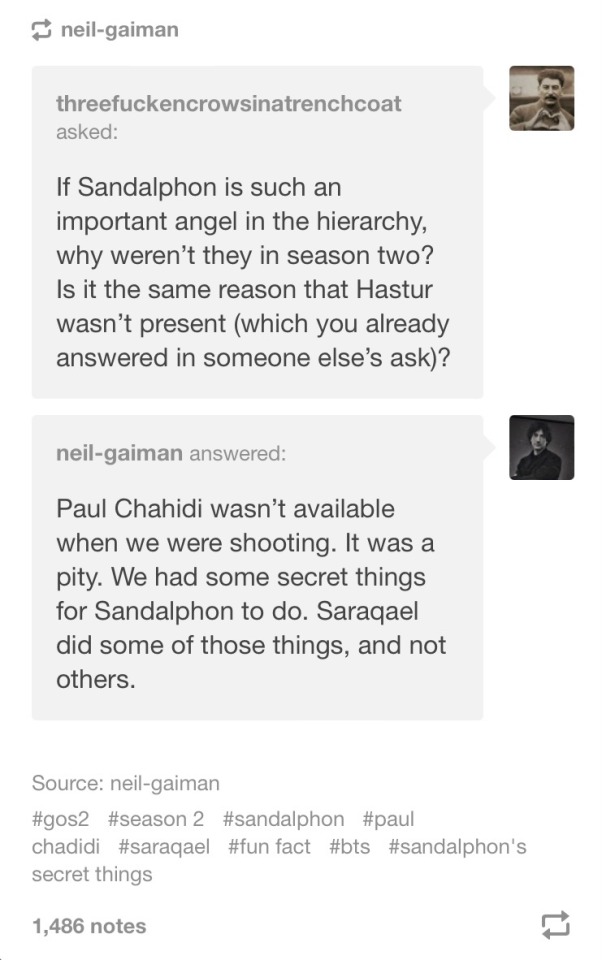
when Sandalphon is introduced in season 1, we learn that he was smiting and turning people into salt during Sodom and Gomorrah. then we see the direct connection Saraqael has with Sandalphon at the end of season 2, when Michael asks her to turn Maggie and Nina into salt pillars and her hand flys up.
but that’s not secret, is it?
you know what is, though?
the fact that she immediately recognizes Metatron in his human form, looks scared shitless for multiple shots, and then proceeds to act like it never happened when he starts addressing all the angels. she doesn’t let anyone know that she recognized him.
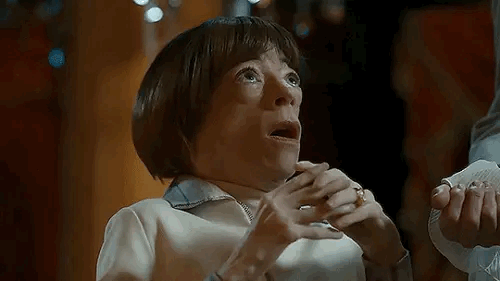
do check out this post by @most-normal-eccles-cake-ignorer with more shots and analysis of her reaction to Metatron.
still don’t believe me and think that reaction is nothing?
well, let me tell you something both the mythical figures Sandalphon and Saraqael have in common.
they both saw Metatron in his human form.
according to one source, Sandalphon was Metatron’s twin brother, and Sandalphon, like Metatron, was originally human.
in the book of 2 Enoch, Sariel/Saraqael was one of the angels who brought Enoch (human!Metatron) to Heaven.
if Sandalphon had been in that room at that moment, he’d also be secretly recognizing Metatron.
obligatory: remember what I said at the beginning of this post? we are using this coding to analyze the story and how the characters interact with it and eachother. you don’t believe that Sandalphon or Metatron were literally human at one point in GO? that’s fine. i’m just giving a reason why the author may have chosen Saraqael and Sandalphon to serve the same purpose in this scene
it isn’t crazy to think that a lot of the historical lore was used to inform the characters, and if you think it is, at least read about Gabriel first.
Gabriel
Gabriel is being coded…as the actual archangel (fucking) Gabriel. (and as Lord Jim from the novel of the same name by Joseph Conrad - the book Aziraphale glances at before choosing to call Gabriel Jim. but you can google the plot of Lord Jim and how it relates to Gabriel on your own time. it’s too much to get into right now.)
Gabriel is an archangel with the power to announce God’s will to mankind. He is associated with messages, vision, telecommunications, and revelation…
…and in the Bible he announces the birth of John the Baptist, and later, Jesus.
30 And the angel said unto her, Fear not, Mary: for thou hast found favour with God.
31 And, behold, thou shalt conceive in thy womb, and bring forth a son, and shalt call his name JESUS
Luke 1:30-31
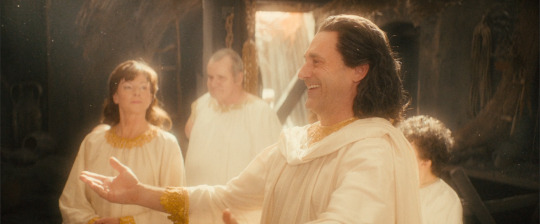
"hey Sithis dude you will not believe this… God now grants that you may conceive seven more children…yippe!!”
let’s get back to that thing about him delivering messages and revelation though.
Gabriel starts off season 2 carrying a box to the book shop (that we think was empty but later find out had a fly in it as well as a message scrawled on the bottom about where his memory is)
he also tells Aziraphale that something terrible was going to happen to him so he had to give him something. you can take that as being the fly, and consciously it probably was, but throughout season 2 Gabriel is unconsciously and unintentionally giving other people messages.
ex.

technically, a message “delivered” (dropped) by Gabriel, found by Muriel
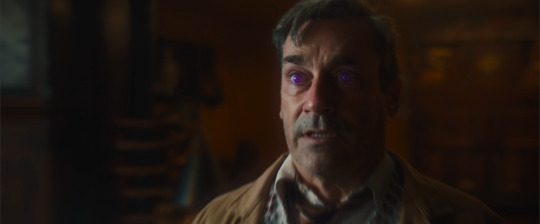
after Crowley not-so-nicely commands Gabriel to remember, Jimbriel says, in a voice that shifts to sound like God’s voice, “I remember when the morning stars sang together and all the angels of God shouted for joy." Crowley recognizes this as what God said to Job, and then another flashback of Job begins.
later, during another vision caused by Crowley mentioning the word tempest: "There will come a tempest then darkness and great storms and the dead will leave their graves and walk the earth once more, and there will be great lamentations... every day it's getting closer."
in the Hebrew Bible, Gabriel appears to the prophet Daniel, and explains his prophetic visions. in Good Omens though, Jim IS the prophet having prophetic visions through Gabriel.
when in the book shop with Aziraphale, Jimbriel starts to hum every day, which is what causes Aziraphale to search down the pub with the jukebox playing that song on repeat. we know from what Terry and Neil have said about every day that it’s the song of the apocalypse, but none of the characters know that, Gabriel included.
what does a song do?
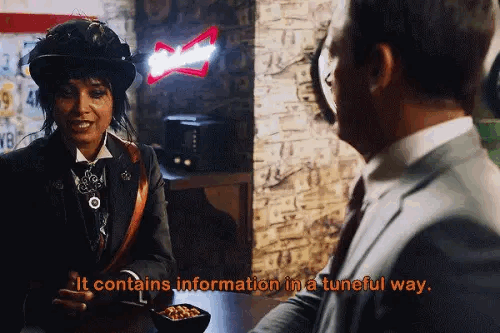
each message the archangel of (fucking) messages delivers is unconscious. not how you’d expect him to live up to his name, right? of course, if they are actually God’s messages, it makes sense that they’re useless, vauge, and well, ineffable. one last thing: spiritually, Gabriel’s messages and prophecies are often believed to be delivered through dreams (or in other words, the unconscious)
edit: this post by @noneorother actually inspired me to look at the mythology of archangel Gabriel, so it’s crucial you check it out. i’ve also seen a post somewhere that posits Gabriel shouldn’t even have some of the memories that go by really quickly before the flashbacks of him and Beelzebub, but i lost the link to it.
edit II: just wanted to add this post by @drconstellation, which analyzes the symbols coded into Jimbriel's clothing.
Aziraphale
it’s hard to ignore the fact that Aziraphale’s name is similar to Raphael, and that we’re missing an archangel Raphael. i’ll link some analysis on the meaning of Aziraphale’s name and share a quote from Terry, but this has all been said before. i want to look at who Raphael is mythologically to see if there’s similarities in Aziraphale’s character, and i also want to see if we can find out the relationship between Gabriel and Aziraphale, and why the latter was a suitable replacement.
Terry said about the name's origin:
"It was made up but... er... from real ingredients. [The name] Aziraphale could be shoved in a list of 'real' angels and would fit right in..."
For instance, Islam recognizes the Archangels Jibril, Mikhail, Azrael (see also the annotation for p. 9 of Reaper Man ), and Israfel (the subject of Edgar Allan Poe's well-known poem of the same name), whereas from Christianity we get such names as Raphael, Gabriel, Michael, and Uriel.
the excerpt above was taken from here
NOW that that’s out of the way, who is archangel Raphael, the mythical figure?
Raphael’s name means “god heals.” it’s believed he helps people heal and overcome their struggles spiritually, physically, and mentally, and that he protects people on their journeys. he’s also considered to be the angel of joy, love, marriage, matchmaking, and travels.
as an example, in the Book of Tobit, God sends Raphael on a journey with a man named Tobias so that he can meet and woo his future wife. Raphael is also sent to heal her and Tobias’s blind, ageing father.
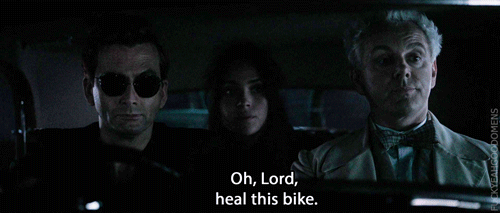
all the people and things i can count just off the top of my head that Aziraphale has healed or protected:
Anathema (healed)
Anathema’s bike (healed)
the dove he accidentally killed (technically healed by Crowley in the book)
Jimbriel (literally tells Jim he promised he would protect him)
Maggie and Nina when the demons enter the bookshop (tells them he will protect them)
bonus: in a scene cut from season 1, he stops a baby’s stroller from crashing
…and one he couldn’t:

collection of gifs of Aziraphale being full of joy:
you just have to look at Aziraphale smiling, especially at Crowley...
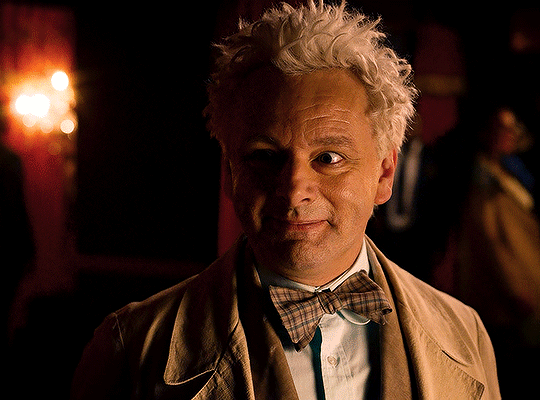
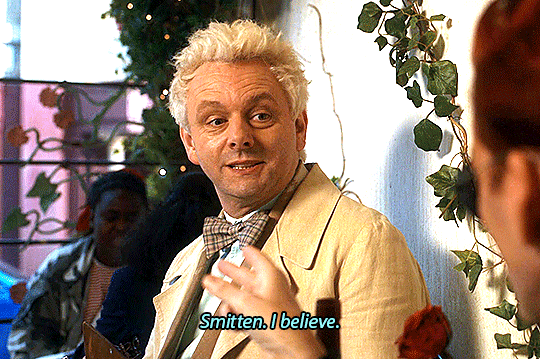

...to know that he represents joy and lo--
oh, but wait, he’s known for hooking people up, right? in case you forgot: Maggie and Nina va voom? originally his idea
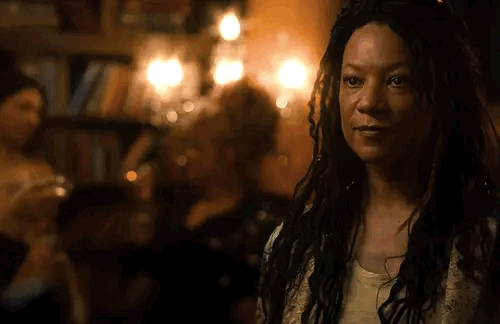
similarly to the book of Tobit story I mentioned earlier, who did Aziraphale protect on his journey to meeting his beloved?
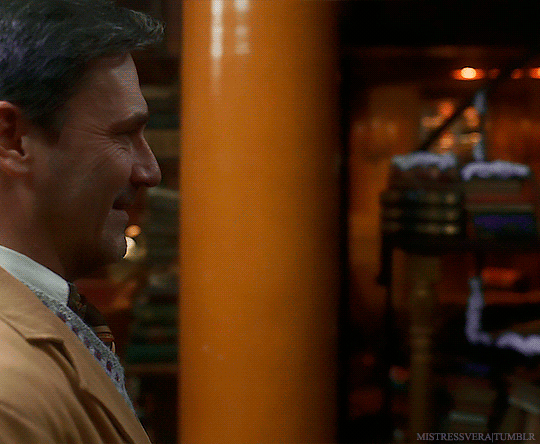
remember: the characters don't know they're being coded as anything and they don't know what kind of story they're in, so while Aziraphale didn't know he was going to be reuniting two lovers when he protected Jim, he played the role Neil made for him. it doesn't matter that he didn't know in the same way that it doesn't matter that Crowley could have (potentially) been powerful, or in the same way that it doesn't matter that Gabriel's messages were delivered unconsciously.
one more thing. Raphael heals people spiritually, physically, and mentally, right?
so is it any surprise that Aziraphale thinks he can heal the *ahem* spiritual corruption in Heaven?
we're going to tinfoil hat theory-land now ya'll, but I swear all of these observations are leading up to something cohesive...
Why did Aziraphale replace Gabriel?
i'll spare you all the long theories about Metatron's reasons, although i quite like the idea that Metatron was listening in ever since Aziraphale opened the portal to discorporate the demons attacking the bookshop, and he saw Aziraphale use his halo to declare war in order to protect Maggie and Nina. this shows Metatron that when pushed into a corner, or when it means protecting someone, he can force Aziraphale's hand...even to war.
But can we find a link between Gabriel and Raphael mythically to explain it instead?
if you've made it this far, you know i've got an answer for you. i withheld one detail about Gabriel earlier. in Christianity, he is often associated with blowing the trumpet at the end times to announce Judgment Day.
"okay, so?"
well, do you remember the quote from Terry and the excerpt from lspace I mentioned earlier? when mentioning the origins of Aziraphale's name, the excerpt mentions both angels in Islam and Christianity. the counterpart to Raphael in Islam, is Israfil/Israfel...
who blows the trumpet to signal the Day of Judgment.
"but Aziraphale wouldn't do that!"
he wouldn't intentionally do it. he's not a villain.
you remember who didn't intend to start the apocalypse in season 1, but who was there and given a role to play, regardless of whether he wanted to?

…the one who said no to heaven and hell and refused to be their pawn this time around when offered powerful positions by both?
Aziraphale, after nuking some demons with his halo, with painful foreshadowing: "I think I may have just started a war."
obligatory reiteration: the way the character-coding manifests is not literal, and it isn't always in the way you'd expect. there may be no literal trumpet. but i'm just pointing out the potential symmetry with season 1 in it being Aziraphale who "starts" apocalypse II.
one last thing: Raphael protects people on journeys, and helps them overcome their struggles — but now Aziraphale is on his own journey, and he will have to overcome his own moral struggles (ironically what Crowley helped him with)…alone.
#good omens theory#good omens season 3#good omens speculation#good omens 3#good omens analysis#good omens meta#good omens sequel#good omens spoilers#good omens#good omens clues#gabriel#aziraphale#anthony j crowley#crowley#sandalphon#saraqael#raphael
76 notes
·
View notes
Text
It floats in the air as though it is seelie-made, glittering crimson radiant where it runs over pale skin and draws him forward, twisting a lovely path that - very much like the seelie themselves – is a temptation nearly impossible to resist.
A testament…that certain things could still surprise him. Nevertheless, he keeps at least one eye on the (harmless) magic that has attached itself to him and goes about his day with the words of a spell in his head and an ever-present pull of another as if they were familiar companions.
He is nothing, if not patient. Stone that will not be so easily moved.
The wait is not a long one, nor is it the chiming tinkle of bells that announces the arrival of the woman whose focus has been drumming a face-paced tempo through the line of string that connects them. At the subtle draw, he allows his hand to be moved, imagining the stranger linking their fingers rather than giving a simple tug.
She’s…interesting. A stillness rooted in serenity in word and tone, eradicated by the war being waged in dark eyes. “I knew you would find me,” It’s uttered like praise, curled in genuine amusement as he greets her with a hand raised so the thread between them shivers in the short distance. Love, the note had said, so he tilts his head to the side and considers.
“Love at first sight?” He hums thoughtfully, the ancient amber of his gaze taking in her stance, her demeanor, the blush lighting her expression- “The concept is well regarded in all cultures, though the foundation of the cause might be specific to the individual fantasy. Such a fantasy demands initial attraction, the spark of the superficial which opens one towards a deeper, more personal interaction.” He could quote several popular Liyuean dramas that survived on the popularity of love in an instant, though that didn’t seem relevant now. “In some cases even, a meaningful connection isn’t necessary at all. Sometimes, physical pleasure can sustain love for several lifetimes.”
Given his preferences for historical accuracy in his retellings, the concept hasn't crossed him in ages. With the thread looming, he recaptures her gaze as he leans back in his seat. His expression fails to lift more than a fraction for amusement, but his answering laugh is short and sweet, in tempo to the way he gestures for movement, expectant, “You may walk by again if you are eager to test your theory, we can weigh the values of individual attraction in appearance alone on a simple numeric scale. Though...the contract could not be quite the same, given the laws of initial meetings. A clause, then, for adoration that grows fonder with each encounter. Is not every new conversation a first, in its own way?” All in all, it’s a satisfactory explanation. He offers his hand, the one that links them. “You may call me Zhongli.”
taken for granite
GHStrings2025 w/ @jadeshielded
#ghstring2025#octoboltflash#i cannot believe she asked the 6000 year old god about philosophy#this is a trainwreck (affectionate)
13 notes
·
View notes
Note
For the Ask Meme!
For Byakuya: 🤡🤔🎲
For Renruki: 🎮 💀🎢
My screen totally went blank and I'm not sure if my previous one was sent (if so, please delete it, it's garbage, I wasn't done editing it lmao). Also the Ask screen is so different in the desktop vs phone/Ipad ugh...
(this is the only version I received, so fear not. Also, I know how Tumblr is)
Byakuya
🤡 - What’s something dumb they’re embarrassed about?
Byakuya does not generally get embarrassed, for the simple reason that he does not do things that he is not proud of, easy peasy. If you asked him what his most embarrassing moment was, he would instantly reply it was the time he failed to protect Soul Society (by getting his guts ripped out) and had to ask Ichigo for help. I think very few people would classify this as “dumb.”
However, lately (epilogue-era), there is one thing, which is that he occasionally accidentally reveals himself to have a Wikipedia-level knowledge of the late Captain Ukitake’s series of children’s books, Sōgyō's Refusal!
Byakuya is a classic hyperfixater, but he’s also well-aware that falls under “things he is not proud of”, so he tries to cultivate interests that make you sound smart and cultured to talk about at length (history, poetry, art, orchids) and has also carefully calibrated the depth to which he can talk about certain borderline topics (swordsmanship, kidou, shogi). If he reads a book and gets excited about it, he will carefully craft an “official take” on it, so if he is asked socially what he thought of it, he will respond in a normal, controlled way. Byakuya actually talking about a thing that he loves is a sign that he has either identified you as a like-minded individual (this is the basis of his friendship with Hitsugaya, and also a lot of what he likes about Renji) or just that he cares for someone deeply (Rukia, once she figured out what was going on, loves to hear Byakuya in this mode).
To that end, Sōgyō's Refusal! is among Ichika’s favorite things. Rukia has a bit of trouble with it, emotionally, so Byakuya took this on as a thing he does with his niece. He has read her all of the books, multiple times. He has played the role of nearly every character in imaginary games. He has answered every possible variation of “who would win in a fight?” and “what is every character’s favorite food?” He has drawn numerous comics starring Sōgyō (he often works the Wakame Ambassador and Ichika herself into these). He would do this because he loves his niece, of course, but the fact is... the books are kind of good?? Like, Ukitake was an educated and well-read man, and there are many references to the classic epics of Soul Society and allusions to historic events? The swordplay is always masterful, and Byakuya is really impressed with the simplicity of the descriptions, making it accessible to children? The are filled with a lot of legitimately funny absurdist humor?
Anyway, he’s slipped a couple of times, once to another noble who was also a parent, and once to Kensei, when the Bulletin was doing a reprint series. It was pretty mortifying both times, but not nearly as bad as he remembered the sensation of embarrassment to be. Both times, he just got a funny look and then they went on with their life. And anyway, there is nothing this man will not endure for the sake of his family.
🤔 - What’s something they’ll never understand?
Why the Ninth Squadron has no sleeves on their uniforms, not even in the winter. It seems foolishness.
(”It’s for the aesthetic, Captain.”
“I hear what you are saying, Lieutenant, but the aesthetic in question is horrible.”)
He also does not understand Lieutenant Hisagi’s facial tattoo and no one, not even Rukia, is willing to try and explain it to him.
🎲 - Pick a random question to answer from this list.
I used a random number generator for this gave me ->
🧑🍼 - How do they feel about kids? Byakuya tends to regard children as just small, incompetent adults. On one hand, this means he is often impatient with them and doesn’t understand their limitations, but on the other, he tends to treat children with far more respect than many adults do.
Rukia and Renji are very intentional about keeping him updated on Ichika’s developmental stages and what their goals and intentions are toward her. He finds the developmental stuff really interesting, and this framing is really helpful for him in terms of tempering his expectations of her capabilities. He respects their parenting values for the most part, but if he wishes to buy a four-year old an eye-wateringly expensive kimono and take her out to a fancy sushi restaurant, is this not his prerogative as uncle? (Rukia and Renji knew he was going to be like this and they just deal with it)
Renruki
🎮 - What’s their favorite game?
They both love football and are the worst trashtalkers in the Gotei-13 futsal league. Renji plays defender for Squad 6, Rukia plays pivot (the primary offensive position) for Squad 13. They holler at each other on the field for forty minutes straight and then have to go straight home afterwards because they’re so horny for each other.
They also love any and all games that straddle the line between games and sports and that they can play together in order to humiliate their enemies. The Kuchiki family New Year’s hanetsuki (badminton) match is a bloodbath.
Rukia is a skilled shogi player and enjoys playing with both her brother and her captain.
Renji does not care for board games, and he especially does not care for the nightmare version of Candyland that Nemuri 8 and Ichika always make him play with them.
💀 - How do they feel about horror movies?
Rukia loooooves horror movies, of all varieties, it is her favorite genre, actually. Rukia is the kind of person who if you say, “hey, you wanna see something fucked up?” she will respond “YES” immediately. Renji likes some horror movies. He doesn’t care for torture porn, for example, and while doesn’t mind splatterfests, it is possible to gross him out. His favorite kind of horror is the more straightforward kind where some people are being chased by or possibly trying to stop a murderer or some sort of monster. He will often offer his opinion of what he would do in various situations. It’s not any sort of judgment on the characters in the movie, and he has no issues with idiotic characters, he just treats horror movies like Choose Your Own Adventures. Rukia does not mind this at all, she loves to hear Renji’s utterly unhinged survival schemes, even though she knows he would definitely die, just, immediately.
Renji gets choked up during Train to Busan.
🎢 - Do they like amusement parks? What’s their favorite ride?
They love amusement parks. As per the Momo version of this question, they got to go to one once on a class trip, but they’ve also been more recently with the Karakura Kids (probably to that place where Chad and Keigo went on a date once). Their actually favorite part of amusement parks is the food, and they are also both very fond of games where you can show off and win cute stuffed animals for Chad. Rukia’s taste in rides is very similar to Momo’s, but she has a slight preference for going fast over big drops, so roller coasters are her favorite. Renji is less impressed by thrill rides. He likes them okay, but if he wants to get a rush, he’d rather just jump off a cliff or ride a cart of questionable structural stability down a hill. The ride he really likes is the Gravitron. If you’re not familiar with it, it’s a spaceship-looking thing that spins around really fast so that you get smashed into the walls with centripetal force. Sometimes a guy just likes the sensation of being a refrigerator magnet, okay? Both Rukia and Renji also love the extremely cheesy haunted house ride at the Karakura park, but they laugh so hard at it that Ichigo refuses to go on it with them anymore.
For the record, Rukia felt much the same way about the Ferris Wheel that Momo did-- she loved the sensation of being high above the Earth, feeling simultaneously insignificant and transcendent. Renji does not remember any of that, but he also looks back on that Ferris Wheel ride with great fondness.
(original meme)
33 notes
·
View notes
Note
Was Alicent really religious in the book? Wasn't she more of Margaery-type of a character ? I remember there was something about her seducing/having affair with Viserys when Aemma was alive , and i don't really remember the greens were conservatives and religious in F&B they seem more ambitious, also wasn't Aegon the only one who was genuinely religious after what happened to him?
Sorry for my many questions but there are many attacks on anyone likes the greens characters in saying that they're misgonystic, right-wingers , trump supporters etc.... And i got confused by that because it has been a long time since I've read the book
(so gonna be honest, it's been a while since I've read the book as well, but I tend to do most of my reading on Ebooks since that's what I've got available so when I remember certain quotations or areas of the story I can just use the search function to pull up the passages I look for, but in terms of beginning to end read throughs? It's been at least a couple years)
So, for starters, the Greens can't be "right wingers" or "Trump supporters" since they don't live in 21rst century America nor is the society that they live in analogous in any way shape or form to 21rst century American society, so the anti-Greens can jot that down and also learn what some words mean (there's a screed somewhere on my blog if you scroll through my "answered" tag on why the "women for Trump" thing wrt Alicent is stupid because of how that's a specific political movement in a very specific social context in a specific moment in time).
The thing is, when I constantly point out that Fire&Blood is a "history textbook" rather than a narrative, I'm not doing that for no reason. It is imperative to understand that the characters in Fire&Blood are not written to be characters in a novel, they are written to act as historical figures that we are reading about from an academic source, all discussed by people with their own agendas and compiled by another person centuries after the events described happened. Nothing in Fire&Blood can be ascertained as one hundred percent true or false save for previously recorded dates of birth and death and major historical events that had multiple witnesses (such as the main battles of the Conquest, or coronations/weddings/other ceremonies). People's thoughts and feelings aren't often written down unless they were being expressed externally, because that's how historical chronicles in a pre-mass literacy society operate in our world. Let me explain: I read a lot of historical texts. And because of my own interests, I've developed a tendency to gravitate towards historical figures who don't always have the best posthumous reputations and around whom there are a lot of "yes no maybe so" type of stories. I'll provide two examples, because this has a point.
Example one, Augustus. Very famous guy, incredibly influential, basically helped shape the Western world as we know it. Also had a lot written about him, not just contemporaneously but also well after he died. There's a story that was spread while Augustus was alive, that was written down by numerous Roman historians as a "well people said it happened so let's just include that they said it did just incase" type of story, that Augustus, who was Julius Caesar's great-nephew through his mother and from a relatively minor branch of the family, ingratiated himself to Caesar in order to become Caesar's primary heir in his will (that happening was a whole Thing) by having a sexual affair with him during a campaign in Hispania when Augustus was 17. However, while we're never going to know for certain, we can pretty confidently say that didn't happen because war camps were just a really inconvenient place to have affairs, for one, and for two, the people spreading this rumor were Mark Antony and his supporters, who had a vested interest at the time in painting Augustus as weak, sexually deviant, conniving, and unworthy fo what he had, due to the fact that he was Antony's primary political rival and was amassing power directly at Antony's expense (if you're wondering why I didn't include things like age or laws against incest in why this might not have happened, Augustus would have been a legal adult at the time and also the Romans didn't consider it incest if the sexual relation was between two people related matrilineally, because they were fucking weird). Another rumor about Augustus is one written down by Suetonius, a Roman historian, who was writing decades after the fact because Augustus had been dead for multiple years and his dynasty (the Julio-Claudians) had already died out by the time Suetonius was born. Suetonius writes that Augustus had an apparent predilection for cheating on his third wife, Livia Drusilla, and specifically with virgins. Again, while possible, it's likely also not true because Augustus was a notorious square personality-wise who also put in place several conservative family and marriage laws that he wanted followed so religiously that when his own daughter, his only child, broke them, he exiled her and permanently ended their relationship, and also Suetonius is notorious for literally just inventing shit and putting it in his works as objective fact.
Example two: Richard III. And I'm not reinventing the wheel by pointing out that a large part of Richard's bad rap after his death comes directly from the vested political interest his successor and his successor's family in painting their reign as legitimate, which would only be possible at the direct expense of Richard (and I am not here to rehash the Wars of the Roses for the five hundredth time, birthright monarchy is a scam and Henry VII won the fight fair and square and both men had good and bad qualities that make them enjoyable to read/learn about). One of the most famous ways that Richard's posthumous reputation was dragged through the mud is with the story that he was heinously deformed, which was a sign of his secret evil. Nowadays, we know for a fact that this isn't true because when his remains were discovered in Leicester, the only "deformity" that was discovered was a case of adolescent onset scoliosis that, while creating a severe S-curve in his spine, would only have manifested physically as one shoulder looking slightly higher than the other, easily disguised with clothing, and that otherwise he seems to have a fair looking dude. But even before we dug up His Majesty's Royal Parking Lot, we could generally figure out that Richard's "deformity" was either an outright fabrication or very slight. Contemporary chroniclers all agreed during Richard's lifetime that the only known physical abnormality was having one shoulder higher than the other, and John Rous, who was at Richard's court and no friendly to Richard considering he also wrote that the dude poisoned his wife (he did not) did note that, while he had a shoulder higher than the other, the difference was slight enough that he wasn't able to remember which shoulder was higher than rich. But once Richard was defeated at Bosworth in 1485 and Henry Tudor took the throne, the line that would ingratiate you to the new king and also show that you weren't a traitor was to point out that Richard sucked, with one of the first instances of "actually Richard was super uggo" happening in 1491 (already six years after Richard died) when a school teacher heard a defense of Richard and launched into a rant about how he was a "crookback" who deserved what he got. Then there was Thomas More, who was a friend to the Tudor royals and whose power at court relied on his proximity to the family and their love for him, who went further in describing Richard as outwardly ugly in order to have it reflect on the fact that he was ugly on the inside as well, even though More was the tender age of seven when Richard died and likely never saw him in person. And then, famously, Shakespeare, patroned by a Tudor and thus knowing that his monetary success came as a direct result of what made the Tudor dynasty happy, took all these biased sources presenting themselves as historical fact and wrote a play depicting Richard as the evil and most monstrously hideous man to have ever lived, and since Shakespeare is more famous than God and had such a huge affect on the English speaking world at large that no one could have ever predicted ("oh Shakespeare's not as famous/influential as-" gonna stop you right there, Shakespeare invented the word pickle, no one is more famous than that), that became stuck in the public consciousness as objective fact, in spite of the contemporary sources and the dodginess of the non-contemporary ones, until we got physical proof of what was true and what wasn't.
So what does that tell us? Historical sources can have biases due to the political machinations of the time, reputations and popular views often get distorted as the years go on and more contemporaries of the subject die, the pop culture understanding of a subject by the general populace can infect even "unbiased" historical compilations about someone, people lie about other people for the furtherances of their own agendas, and that things told after someone's death by non-contemporaneous writers need to be examined within the context of that person's known personality and habits and also that sometimes people are just liars for no other reason than the lolz. Historical texts in a pre-mass literacy society, while important, are not wholly unbiased sources, since the concept of "the biography" is only a couple centuries old (and I'm being generous). Historical texts can include things like political leanings dictating what's being written down, distortions in the hopes of gaining favors, social views that were the norm at the time but changed from then to the present, the inclusion of rumors without delving into whether they're valid or not, and sometimes authors just blatantly making shit up. That is the conceit under which Fire&Blood operates as a book. That, unless it's a birth, death, or major historical event, we simply cannot know anything as objectively true or false and need to take every single story with a grain of salt, and it's up to us as the readers to decide what's most likely based on consistencies in stories/characterization along with the objective known facts. Nothing about these people can be taken at complete face value and any stories told about them need to be closely examined even by us as readers who are aware that it's fictional.
So, with all that in mind.
Is Alicent described as religious in the book? Not explicitly, since not much of her personality was recorded and we actually know very little about her character. But it's safe to assume that she was religious to an extent, the Hightowers are from Oldtown and Oldtown was the current center of the Faith of Seven at the time since the Starry Sept was still the epicenter of that religion given that it only changed once Baelor built his Great Sept. And even beyond that, Westeros is a religious society, analogous to Middle Ages Europe, and religion played a significant part in every day life. So it's not out of the question that Alicent was religious, perhaps even more religious than the average Jeyne, but whether she was as religious as her show counterpart, and whether the motivations were the same (loneliness, desire for community amidst isolation, clinging to moral superiority when she feels she's a bad person for her wants and desire) is unknown.
Wasn't she more of Margaery-type character? Well, for one, book Margaery or show Margaery. The two Margaeys are incredibly different characters, almost to the point of not being the same character at all. Since Margaery is not a POV character in the books, and we only see her through the eyes of Sansa, Cersei, and briefly Tyrion, we don't really know what she's like. We know she's very intelligent, and we know that she possesses a shrewdness and cunning not unlike Olenna, as Sansa remarks, but Margaery is also very kind, very sweet and gentle, and tenderhearted to a certain extent, as well as the model of a proper young Westerosi (and also according to Cersei a vicious slut but Cersei's viewpoint of people is so distorted we can't rely on anything she says or thinks). Show Margaery is honestly just what Cersei thinks book Margaery is, as if D&D read Cersei's POVs for Margaery and took that at face value without remembering that Cersei has never had a correct observation about another person ever, except Robert. Show Margaery is also intelligent and cunning, but she's conniving and fiercely manipulative, incredibly power hungry and more sexually open than book Margaery. Is Alicent like either of those? Again, hard to say, we don't really know much about Alicent as a character other than that she held grudges, was ambitious for her kids, and loved her family with everything, tender and gentle with people who mattered like her children and grandchildren (given that they always came to have her say goodnight to them every night aaaaaaahhhhh) and was a somewhat unforgiving person, which she appeared to pass on to her two eldest sons. She doesn't really seem like either Margaery to me, especially in the fact that, while book Margaery might be putting up a sweet facade to hide true feelings and show Margaery absolutely does that, Alicent doesn't. She has no problem exhibiting what she really feels on full display without hiding anything, likely due to her power as queen consort (like her "do keep trying Ser Laenor" line, ugh cuntery at its finest). The main similarity between either Margaery and Alicent that I can think of is that they're both incredibly well loved by the commons.
Did Alicent have an affair with Viserys while Aemma was alive? No. Again, not something we can know for certain because "historical" but looking at it, no. There's no evidence that Viserys ever kept any mistresses in either of his marriages, Alicent doesn't get married as young as she is in the show but she's still eighteen and that's pretty young, the only way this would be marginally appropriate and allowed by Westerosi customs is if she were an official mistress, which she isn't ever described as, it doesn't line up with any of her following actions or how she's described later in her life, and also the only person who even hints at any sexual impropriety in Alicent's past in F&B is Mushroom, who is one of those aforementioned sources that lies just because they wanna lie and add things in for no reason (and also because GRRM likely wanted more sex stuff in the book than he'd have been able to do due to the constraints of the format he chose and added Mushroom in as this asshole ribald lil lying liar who lies in order to do that).
Were the Greens conservative and religious? For religion, please see answer number one, which is just: most likely religious, no way to know whether they were more or less religious than other Westerosi, particularly Westerosi Faith worshipers. For conservatism, pleas see the first full paragraph of this behemoth of an answer. The concept of conservatism has changed drastically over human history, and often has specific definitions and political affiliations based on which country you live in, and even if we mean American conservative, this is not an American based society with any American based values and it's practically impossible to try and attach those to people living in what amounts to Middle Ages England but with dragons and blood magic.
Were the Greens ambitious? Yes, they very much were ambitious. So is every other character in Fire&Blood. They're not more or less ambitious than any Westerosi family, it doesn't seem like that ambitious motivation was changed all that much in the show either, just certain characters are less so (most notably Alicent).
Wasn't Aegon the only genuinely religious one? Again, I return us to the first answer, which is that he likely was religious but there's no way to know whether he was more or less so than anyone else (unless you take a certain Mushroom story at face value which I do not because not even the guys compiling the in universe histories take Mushroom at face value). There's nothing written down about Aegon being particularly more devout than most people expect, since the majority of what's written about him on his own as a person is devoted to him during wartime, in which he isn't described as doing anything particularly religious since he's either fighting or convalescing. The only concrete thing we get is when he goes to the royal sept and subsequently dies, and there's no explanation given for why he wanted to go there (if you're like me, it's cuz you believe the suicide theory and are incorporating it into how you think the show should end so that you can then cry for ten thousand years about it). You can certainly believe that his experiences and what he suffered might have made him more open to devotion, that he turned to the gods in hope of comfort, but you could also make the argument that all his pain would have turned him against the gods, like Stannis's anti-Seven ideals being borne of how he refuses to worship any gods who would let him watch his parents die.
And lastly, never apologize for too many questions anon! For one, people make this confusing because between the source material and the changes and everyone taking this shit way too seriously, it can be tough to parse everything out. And for two, I love questions! I'm an incessant rambler and I get bored easily and unless people are being rude, I always love when people wanna chitchat with me about stuff <3
#personal#answered#anonymous#wow this got to an ungodly length#but i figured i might as well type this whole thing out so that people have it on hand#cuz i keep on repeating this and i think some people wonder why#and i do wanna explain why#it's like hugely important for us to remember what f&b is presented as#as with all things this is in fact rebloggable if anyone wants to have easy access to my ranting#on why we need to treat f&b differently than we do most stories
3 notes
·
View notes
Note
Halo! Here's a reddit link to information and research papers about onmyodo consolidated by other people and a link to an overview. Tried to summarize below bits and pieces that may be relevant to jjk (and which I tried to understand to the best of my abilities :P )
I think this will be the last time I write such a long-ass ask again, my apologies
About cursed spirits and mono
Court onmyojis in Heian used divination to find out the cause of things like curses, strange events (kaii), natural disasters, illness, why your dog is barking at a seemingly empty spot (answer: Megumi's divine dog is barking back) and so on. Strange events were referred to as mokke (物怪) or mono no satoshi (もノノサトシ) and believed to be omens of calamity that were caused by mono or "things" which could be anything like the curses of gods or something from the Imperial mausoleums. Furthermore, during the rule of Emperor Kanmu from end of Nara to early Heian, the Ritsuryo system of government began to crumble as imperial rule changed hands and political victims were feared as onryō (怨霊) that caused disease or death to the Emperor's nearest relatives (but not the Emperor himself). The fear of strange phenomena spread through the aristocrats and became commonplace. Onymojis were believed to be able to deal with the curse of mono as well (otherwise it's off to the chopping board for their jobs (and lives) they go, chop chop). And so the Imperial Court funded them to perform quelling rituals and ceremonies to appease gods, clear away damages by insects, pray for harvests and prevent the spread of epidemics (which ironically was exacerbated by the court's overspending and large-scale deforestation but that's another story). For individual cases like the spirits of living persons (ikiryō or ikisudama), or spirits of dead people (akuryō, ryō, onryō, shiryō or bōkon), onmyojis might determine that spiritual energy or evil spirits (mono no ke) was the cause but mikkyō genja (験者) or ritualists were the ones to subdue it by incantations. JJK cursed spirits resemble mono no ke in that they cannot be seen and may harm humans. Whereas jujutsu sorcerers are more like genja ritualists (complete with flashy kamehameha bombs) (and besides being cursed).
Lifespan rituals
The most popular theory for Sukuna's fixation with Megumi has already been covered by this blog owner with additional info on the Ten Divine Treasures. Another theory is that Sukuna could have been aiming for a higher level of enlightenment. Besides the Shinto-Buddhism angle, Onmyodo also has its own set of rituals concerning life and death. Onmyodo is basically a system of divination and techniques that focuses on worldly benefits and has no vision of the world after death. The rituals were instead based on the Chinese beliefs in honmyō (本命), Zokushō (属星) or the realm of the dead (冥界) and by the end of Heian, there were more than forty Onmyodo rituals to pray for the individual health and longevity of aristocrats (commoners: eat the rich 👎). For the terms honmyō and Zokushō, the closest meaning I can give without being too horribly misleading would be the life/destiny that you are born with according to your birth year, zodiac, constellation and so on. The most popular ritual was Taizan Fukun sai (泰山府君祭), which originated around the beginning of the tenth century and was closely associated with Abe no Seimei (yes that guy you keep seeing in anime). Taizan Fukun (泰山府君) is the lord of the eastern peak of Mt. Tai in China, a deity that summons the spirits of the dead and administers the lengthening and shortening of human lifespans. Twelve deities of the realm of the dead including Taizan Fukun were involved in this ritual. It was implemented on every honmyō day, but also as needed for illness, childbirth, natural disasters, and strange events. Media adaptations often depict Abe no Seimei (or other onmyojis) using the ritual for resurrection or reincarnation 😅 e.g. Tokyo Ravens, Shaman King, Onmyoji (2001). I don't think Gege will go for the same cliché trope for Sukuna but it's still interesting to know.
Seimei and Dōman (Gojo and Getou)
Anyone who knows about the folklores of Abe no Seimei 安倍 晴明 would be familiar with his eternal rival, Dōman 道満. Like Gojo who's the strongest jujutsu sorcerer, Seimei was the leading onmyoji specialist of his time. His position as the Kurōdo-dokoro onmyōji (highest-ranking onmyoji), legendary reputation and long lifespan lent to the notion that he had mystical powers due to being born from a human father and a kitsune mother. During Heian, Onmyodo referred to the organization of onmyojis under the control of high-ranking people of the same profession (kinda like the JJK elders) rather than the system of beliefs known today. Onmyōji with official status like Abe no Seimei would be kanjin onmyōji (官人陰陽師) or official onmyōji. Non-official onmyojis would include hōshi onmyōji (法師陰陽師) or priest onmyōji, who had the appearance of Buddhist priests (like how Getou was dressed as a cult leader), and presumably the control of the Onmyōdō did not extend to them. Official onmyōji, under the strict supervision of their superiors, would not have been permitted to have any connection with criminal acts such as curses. Instead, the Heian nobility turned to hoshi-onmyojis like Dōman to lay curses on their political rivals. There were many incidents involving curses within aristocratic society in Seimei’s time, and in a majority of cases the curses were placed by hōshi-onmyōji. Dōman himself had been spotted visiting a noblewoman, Takashina no Mitsuko, who employed hōshi-onmyōji to put a curse on several prominent political figures. Getou: "Let's curse each other... to our hearts' content!"
War onmyojis (and questioning of Gege's probable naming sense)
The Sengoku era treated court onmyojis poorly (ceremonies were expensive to fund). Warrior onmyodo being more practical (divining auspicious days for battle/forming alliances and exorcising evil spirits) became prominent instead. Academies that taught Confucian studies with divination and medicine as part of the curriculum flourished and the most famous was Ashikaga Gakkō (足利学校) (not as modern as Tokyo Jujutsu High though). Like Nanami and co. who became professional sorcerers, many of its students went to the battlefield as diviners and doctors. When peace returned during Tokugawa Ieyasu's rule, a few practitioners thrived by attaching themselves to powerful men. One would be Tenkai (天海) and another Kanshitsu Genkitsu, head of the Ashikaga Gakko. Being Ieyasu's bff, a temple Fushimi Enkoji (伏見円光寺) modeled after Ashikaga was built and Kanshitsu appointed as its head. Ieyasu also sponsored Kanshitsu's Fushimiban (伏見版), a publication project printed with wooden blocks. I'm definitely reaching here for Tengen and Fushiguro but I do wonder if Gege ever chanced upon those names.
🦆A Tail of Many Kamos: 鴨川, 下鴨, 鴨, 加茂, 賀茂 🦆
鴨川 - the Kamo river northeast of the Heian capital (modern Kyoto)
下鴨 - the Shimogamo Shrine (下鴨神社), a Shinto shrine dedicated to the Kamo family of kami
鴨 - the clan associated with the Kamo shrines and the famous poet-priest Kamo no Chōmei (鴨 長明) who witnessed the end of Heian. Also Bucephala albeola.
加茂 - Kamo no matsuri (加茂祭) or Aoi no matsuri (葵祭), an annual festival of Shimogamo Shrine and Kamigamo Shrine and one of the three major festivals in Kyoto, also one of the three big jujutsu clans (加茂家) in JJK. It's funny that Gege would choose a name with the same pronunciation as a real-life historic clan, which brings to the next point.
賀茂 - the formal name of the Shimogamo Shrine (賀茂御祖神社), also a once-prominent Heian Onmyoji family that died out during the Sengoku era. Thereafter, the Tsuchimikado (former Abe clan) took over their hereditary duties of keeping the calendar. Abe no Seimei's teacher was the astrology scholar (tenmon hakase 天文博士) Kamo no Yasunori (賀茂保憲). Could Kenjaku be based on Abe no Seimei as well?
The Musical Exorcist
The rock-n-roll grandpa, Gakuganji, might be based on the lesser known lute-priests called biwa-hoshi (琵琶法師) or zatō (座頭). Their musical style is referred to as heikyoku (平曲), which literally means "heike music". Accompanied by their mōsō-biwa (盲僧琵琶), the often-blind lay priests would chant Buddhist mantras, placate earth deities, perform spirit pacification chinkon (鎮魂) of vengeful spirits including onryō, communicate with the dead (Principal Yaga 😢), purify defilements haraikikyomeru (祓い清め) and border rites kyōkai girei (境界儀礼) that expel malign forces. The thesis "From Heike to Nomori no kagami" suggests that the musical practices and theories of Heike correlate with Yin-Yang principles. Which I will not further expound bcos I haz zero music theory knowledge and also this ask is far too long 😛 Hopefully Gakuganji will not remain blind to the less-than-holy intentions of the jujutsu higher-ups as the story continues.
Hello, lore anon! Thank you for compiling another stellar read!
Aaw, you'll be missed, but it's fine. Just do things and drop by if you feel like it.
Yes, onmyodo has a large influence on Japanese pop culture. Numerous manga takes their inspiration from onmyodo, jjk only one of them. Onmyouji had a very large political influence in the court. They were also a legit government position, literally civil servants back in the day.
The legend of Abe no Seimei and his rival Ashiya Douman is also famous. Abe no Seimei was said to be born from a kitsune (fox spirit) mother and human father, so he is often thought to not be fully human, hence his supernatural ability. I wouldn't be surprised if one of these characters is inspired by either Seimei or Douman; Sukuna, Kenjaku, or Tengen.
Kamo, yes, it seems that Gege actually takes the name of the clan. The fanbook said that Kamo clan arised to influence during the heyday of Heian period, the Golden age of Jujutsu. While it's lesser known, Kamo family is quite a legend too alongside Abe no Seimei in onmyoudou. As you said, Kamo no Tadayuki and his son Kamo no Yasunori has been known to teach Abe no Seimei.
92 notes
·
View notes
Text
WHAT IS THE LOONAVERSE? PART 2 – THE NARRATIVE DEVICES
LOONA is special among K-pop for its immersive storyline. These girls are not just k-pop idols performing a song, they also perform a story and that story is what we call the Loonaverse.
So, what is the Loonaverse? In a few words: The world and story that LOONA inhabits.
Yeah. Duh. But what is it?
Well… it’s complicated.
The Loonaverse is a fictitious story that borrows elements from real science and fantasy to build its world but also uses allegories, metaphors, allusions and other literary devices to tell its story. Our job as spectators (and specifically us theorizers) is to look beyond those devices to understand the message they are trying to send. In this post I’ll attempt to explain the numerous literary devices used to narrate the story of the Loonaverse.

So, these 2 things are LAW:
Each girl has two conflicts: an external one and an internal one.
The LOONAVERSE story is one of fantasy and mystery.
INTERNAL CONFLICT VS EXTRNAL CONFLICT
Or as I like to call it: UNIT vs SOLO
I’ve explained how the girls are trapped in a time loop and how escaping it was their overarching goal. This is the external conflict of the Loonaverse. The progression of this storyline is seen mainly in the Sub-Unit MVs and LOONA MVs but also in some teasers and other videos like Cinema Theory. The conflict is external because: 1) It comes from the outside. 2) The characters not have power against it, at least not at the beginning. 3) The conflict has effect over multiple people.
Also…
Every character has an internal conflict. A personal story. Each girl perceives the world differently and that changes the way they act and interact with each other. It is internal because: 1) It comes from within the person. 2) They themselves may be the cause for the conflict. 3) The conflict has effect on only one person: themselves. This Internal conflict is presented to us in the Solo MVs. Every solo MV is a window to the character’s mind. While the solo MVs are tangentially related to the main external conflict, they mostly focus on the internal conflict of the character.
External and Internal conflicts often mix and interlace each other to create a wider story. We will see how the external conflict fuels the internal conflicts of the girls and how their internal conflicts will shape the way they act towards solving the external conflict.

FANTASY AND MYSTERY
What is fantasy? The genre of fantasy is described as a story based in a world completely separate from our own. It usually features elements or magical/supernatural forces that do not exist on our own world. It is not tied to reality of science.
Wait a minute. You just spent an entire post explaining the science of the Loonaverse. You can’t call it fantasy now. Well yes, yes I can. Since most of the scientific elements I explained are theoretical, unproved in our world but in the world of LOONA they are a reality, a scientific reality. A reality that differs from our own, and thus a fantasy to us. But regardless of that the reason I call the Loonaverse a fantasy is because of the themes it explores.
Fantasy is a broad genre, it is one of the oldest literary genres, being found in old myths. Some of the themes often found in fantasy stories include: tradition vs. change, the individual vs. society, man vs. nature, coming of age, betrayal, epic journeys, etc. All of these themes are very present in the Loonaverse. But I’ll delve into each one as we encounter them.

What is Mystery? The mystery genre is a type of fiction in which a person (usually a detective) solves a crime. The purpose is to solve a puzzle and to create a feeling of resolution with the audience. Some elements of a mystery include: the Crime that needs solving, the use of suspense, use of figures of speech, the detective having inference gaps, the suspects motives are examined in the story, the characters usually get in danger while investigating, plus these:
Red herring. something that misleads or distracts from a relevant or important question and leads the audience to a false answer.
Suspense. Intense feeling that an audience goes through while waiting for the outcome of certain events.
Foreshadowing. A literary device that hints at information that will become relevant later on.
I just though you should know these definitions.
In the Loonaverse, the “crime” is the time loop itself, and the mystery is finding a way to break it. Or so we think. In reality, the “How do we break the loop?” question is solved rather easily. But can we really call this a mystery if the main question is already answered? Yes! It may no be a mystery story for the characters themselves but because BlockBerry uses various mystery genre tropes while telling the story, it is a mystery TO THE AUDIENCE.
That’s right! WE are the detectives!
In a classical mystery, the detective examines all clues, motives, and possible alibis, for each suspect, or in our case, each character. The same way we analyze every MV, every interaction, every possible clue to where and when everything is happening.
The Loonaverse differs from a classic ‘Who done it?’ by establishing that no suspect is actually guilty. The crime IS the loop, but no girl is responsible for it (or so we think). Our job as detectives is not to figure out who is doing this but to explain how and establish an timeline of events that shed a light to what really happened. In that sense, our job resembles more closely a real crime investigation than a mystery novel.

LITERARY DEVICES
There are many literary devices an author can use to tell its story. Too many to cover them all in here, so I’ll focus on the most recurrent ones in the Loonaverse:
Allusion. Referring to a subject matter such as a place, event, or literary work by way of a passing reference.
Archetype. Reference to a concept, a person or an object that has served as a prototype of its kind and is the original idea that has come to be used over and over again.
Faulty Parallelism. the practice placing together similarly structure related phrases, words or clauses but where one fails to follow this parallel structure.
Juxtaposition. The author places a person, concept, place, idea or theme parallel to another
Metaphor. A meaning or identity ascribed to one subject by way of another. One subject is implied to be another so as to draw a comparison between their similarities and shared traits.
Motif. Any element, subject, idea or concept that is constantly present through the entire body of literature.
Symbol. Using an object or action that means something more than its literal meaning, they contain several layers of meaning, often concealed at first sight.
Genre. Classification of a literary work by its form, content, and style.
Some other literary devices worthy of your private investigation are: Negative Capability, Point of View, Doppelgänger, Flashback, Caesura, Stream of Consciousness, Periodic Structure, THEME, Analogy.

About Genre:
Genres are important because they give a story structure. They help an author tell the story in a way that makes it simple for the audience to understand what kind of story is being told. The classic genres of literature are Poetry, Drama and Prose. Some scholars include Fiction and Non-fiction.
In film there are a variety of accepted genres: Comedy, Tragedy, Horror, Action, Fantasy, Drama, Historical, etc. Plus a bunch of subgenres like Contemporary Fantasy, Spy Film, Slapstick Comedy, Psychological Thriller, etc. What defines a genre is the use of similar techniques and tropes like color, editing, themes, character archetypes, etc.
I point this out because the Loonaverse uses many genres to tell its story. Sure, the main story is a fantasy/mystery but every MV or Teaser has its own genre (especially the solo MVs). So, when I point out later that Kiss Later is a romantic comedy or that One & Only is a gothic melodrama, this is what I mean.
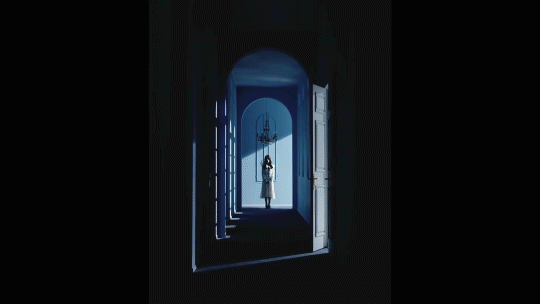
TLDR:
The Loonaverse is the world and story that LOONA inhabits. It borrows form real life science and fantasy elements to better tell its story. Each girl has an external conflict (escaping the loop) and an internal conflict (portrayed in the solo MVs). Both conflicts interlace to tell the story. The Loonaverse is a story of Fantasy because it takes place in a different world from ours and it is a Mystery because it is told using various mystery tropes. The story uses multiple literary and visual devices to tell it’s story and fuel the mystery.

REMEMBER: This is all my interpretation. My way of comprehending and analyzing the story. You don’t have to agree with everything. I encourage you to form your own theories. Remember: every theory is correct.
After all that you may be wondering what the story even is. And we’ll finally be getting to that. While I have my own interpretation of the timeline, themes and who did what. I think it’s more fun to slowly explore every brick instead of just summarizing it in one (incredibly long) post. I’ll do that much, much, much later. The journey will be just as interesting as the destination. I hope you’re in for the ride.
Let’s get to the real deal: The MVs. I’m going in chronological order so let’s start with girl No. 1!

Next: The bright pink bunny of LOONA: HeeJin’s ViViD.
#yeah i know its been months#life's tough kids give me a break#loona#loonaverse#loona theory#loonatism#heejin#hyunjin#haseul#yeojin#vivi#kim lip#jinsoul#choerry#yves#chuu#go won#olivia hye
91 notes
·
View notes
Text
Shingeki no Kyojin headcanons: 104th training corps (College AU)
Hello, Postmodernbeing here. This time I wanted to write about things that I actually know, since I’m a college student and I’m studing History and Social Sciences I found myself wondering about what would the 104th training corps focus their studies on if all of them had chosen humanities as their career. I hope you find this funny and at least a bit accurate.
IMPORTANT: I do not own Shingeki no Kyojin, only these HCs are my own. // Might contain a few spoilers from the manga. // English is not my first language and I study uni at Latin America, so scientifical terms/words/concepts may vary. Anyhow, I thank you for reading and for your patience.

Eren Jaeger
He’s passionate about Military History, not to be confused with history of army. Eren’s rather focused in strategies, weapons and semiotics involved in military speech.
First started with books about great wars in modern era. The use of certain weapons took him by surprise due the technological development.
Then he took classes about discourse analysis, semiotics and such, and felt inspired by the discourse reflected in emblems, uniforms, flags, etc.
Eren doesn’t really have a preference between occidental or oriental, North or South, Modern or Ancient settings. He would simply devour all the books that deal with military strategy and warlike conflicts. Although he has more experience and information about great wars in modern era.
He’s fascinated with the inexhaustible human desire of freedom and the extent that it can reach. This fascination might not be very healthy, he concludes.
Also, finds a cruel beauty in violence when showed in freedom and ideals are protected over one’s own life. But he won’t tell his classmates or professors. He knows is a controversial opinion for he’s still aware the implications of massive conflicts and the abuse of power.
One thing led to another, Eren is now taking classes and reading about philosophy in war and anthropological perspectives about violence through time.
He’s so into social movements besides his main interest in college: “No one’s really free until all humanity is”, that’s his life motto pretty much.
Due his readings and researches he decided it was important to develop a political stance about the world’s problems. Eren strongly believes all lives worth the same, but systems and nations had imposed over others and vulnerated other human's lives.
Yes, Eren is anti-capitalist and anti-imperialist.
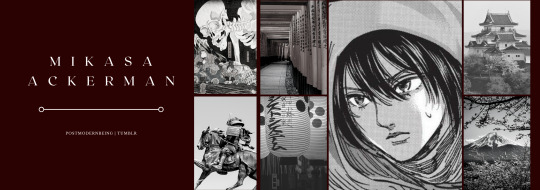
Mikasa Ackerman
Asian Studies Major / History Minor.
She thinks by studying these degrees, she pays honor to her heritage. Specially to her mother. Her family is the proudest for Mikasa is also the best student in her whole generation.
Mikasa received a scholarship thanks to Azumabito family, who are co-founders of an academic institution dedicated to Asian historical and cultural research. She might as well start working when she graduates.
Although she’s passionate about Japan’s history, she has written a few articles and essays about Asian Studies themselves and the importance of preserving but also divulging by means of art and sciences.
In her essays and research work, she likes to employ tools from many disciplines since she strongly believes all humanities and social sciences serve the very same purpose at scrutinize the social reality all the same. Might as well use demographics, ethnology, sociology, philosophy, anthropology, archeology, and so on. For it proves to bring light into questions that history by itself could answer unsatisfactorily (in Mikasa’s opinion).
Even her professors wonder how she manages to organize that much information and pull it off successfully. She might as well be more brilliant than a few PhD’s students.
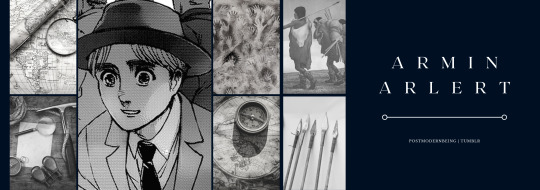
Armin Arlert
Prehistoric studies / Archeology
He’s so into the studies about the prehistoric humans and routes of migration.
Passionate about the ocean and natural wonders since kid, Armin believed his career would be environmentalist or geoscience related.
That was the agreement he had with his grandad since middleschool, until he read Paul Rivet’s “The Origins of the American Man” book and captured him thoroughly. The way the book explained logically the diverse theories about global migration and enlisted the challenges of modern archeology -for there are numerous mysteries- simply devoured his conscience.
He knew from the books he’d read that most evidence of the first settlements are deep under dirt or far away in the ocean whose level has risen over the centuries leaving primitive camps – and answers – unreachable.
That’s the reason he is so eager to study and give his best to contribute both archeology and history disciplines. Also, he’ll forever love the ocean and nature, just leave him do all the fieldwork, please.

Jean Kirstein
History of industry / Industrial heritage / Historical materialism
Jean first started interested in capitalist industries and production development in first world countries. Kind of rejected other visions and explanations since he’d read about positivism studies.
His interest in such matters started when he was a just boy. He often found himself wondering how things were made and that question captured him ever since. As he grew up, he realized that machines and industrial processes were highly involved in the most mundane objects creation.
Nonetheless, he learnt that not always the best machinery was used, nor the best work conditions were available for mass production. From that moment he’d started to read about the First Industrial Revolution and his mind just took off with questions. Invariably, he learned about labour struggle and the transforming power due workforce.
Between his readings and university classes, he’d knew more about labour movements, unions. And in the theoretical aspect, he'd learned about historical materialism analysis.
One could say that Jean possesses a humanistic vision of the implications in mass production under capitalist system along history and nowadays.
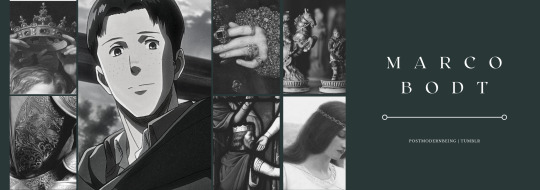
Marco Bodt
Royalty's history / Medieval Studies
I wanted to keep his canonical fascination to royalty and the best way to do that was including Medieval Studies.
Marco would study since the fall of Roman Empire until the latest gossip of royal families all across Europe.
Might get a bit of Eurocentric with his essays but in real life discussions he’s always open to debates about decolonization. He has even read Frantz Fanon books and possesses a critical thinking about colonial countries and their relations with the so named third world.
Nevertheless, Marco finds a strange beauty in the lives of monarchs and he’s interested in study from their education, hobbies, strategies, relationships, everything.
I’d say that his favorite historical period is probably the establishment of the descendants of the barbarian peoples in the new kingdoms such as the Visigoths, Ostrogoths, Franks, Vandals, Huns, Saxons, Angles and Jutes (holy shit, they're a lot).
Because this would transcend as the beginning of his favorite matter of analysis.

Sasha Braus
History of gastronomy, development of cooking, antropology and archeological studies.
Sasha’s interested in the history that shows human development of food and cooking. She finds wonders when she inquires into cultural aspects from the first farming till modern artistic expressions that would involve food.
Such as gastronomy. But her attention got caught in literature’s food representation too, with its symbols and allegories, also in paintings that belong in still life movement, but also Sasha finds interest when food is used as rhetorical devices (for example: the apple in Adam and Eve’s myth).
She’s curious about primitive systems of irrigation, cultivation, food distribution, adaptation of wild species; as well as the domestication of animals, the diversification of the diet and its link with sedentary life, as well as the subsequent division of labor once the need for food was assured in humanity’ first cities.
Sasha’s convinced that alimentation is the pilar of civilization as we know it. For it involves cultural, artistic, economic, emotion and social aspects. Food is a microcosm of analysis of humanity.
Sasha hasn’t a favorite historical period or setting. But she definitely has a special fascination for first civilizations and their link with alimentation. Also, she likes to study the development gastronomy in occident world around different regions, social classes, and time.
Although, let’s be honest, Sasha would devour (lol, couldn’t help it) ANY book about agriculture, cattle raising, cooking or gastronomy.

Connie Springer
Micro-history / History of everyday life.
Connie loves his hometown, has a deep respect to his family and traditions. That’s why he finds himself wondering about the most ordinary events that developed in his dear Ragako.
The book “The Cheese and the Worms” by Carlo Ginzburg changed the way he used to understand history and capture him into meaningful discussions about what he learned was called micro-history.
His favorite quote from that book is: “As with language, culture offers to the individual a horizon of latent possibilities—a flexible and invisible cage in which he can exercise his own conditional liberty.”
Once deep into studying the Italian historians and their works, he decided to give it a try, and ever since he’s mesmerized with the mundane vestiges craftsmen that worked in his village left behind.
Connie’s parents are so proud of him and his achivements, but mostly because he became a passionate academic over human and simple matters, (so down to earth our big baby).
His attitude towards his essays and research works truly shows his great heart and humility. Connie is aware that academic works have no use if they are not meant to teach us about ourselves too and current times.
Empathy and hard work, that’s how one could describe the elements that integrate his recently started academic career.

Historia Reiss
Political History / Statistician
Her father’s family pressured Historia since she was a little girl into studying History just like his dad. For he’s a very famous historian that had made important researches and books about the greatest statesmen of Paradis.
She thought in numerous ways that she could sabotage her career or study any other career without her family’s consent and end with her linage of historians. But she ended up enrolling in tuition and so far, she is trying her best in her studies. Historia swears this is the right path for her.
But don’t let the appearances fool you, even thought she studies her father’s career and the very same branch of history’s discipline, she has her own critical sense and she’s so talented on her own, very meticulous with her research papers.
Definitely wants a PhD about women, power and politics. We stand a Gender Studies Queen.
Her complementary disciplines are Political Sciences. Historia also has a talent for philosophy and owns a diary with all her thoughts about them. She hopes one day she would write a book or a manifesto about an innovative methodology for research and teaching History of Politic Thinking.

Ymir
Religion’s History / Theology
Just like Historia, Ymir was pressured into studying History. And if she’s totally honest, she still has some doubts about it. Even if she couldn’t imagine herself studying anything else.
Anyways, Ymir thought that she could build her career around topics that she enjoys. So, she finally chose theology for unusual reasons.
Her classmates had grown up in religious families or had experience studying the doctrines they practiced. But she, being an agnostic, found satisfaction in unraveling belief systems in different cultures and time periods.
Albeit she studies in Paradis’ University, she currently has the opportunity of taking an academic exchange at Marley’s University. This only made Ymir more conflicted about her future, for she wants to stay (near Historia) but she’s aware that Marley would offer her more academic opportunities for her specialization.
Nowadays she’s working in some collaborative research paper with some people from Mythological Studies from the Literature department. She’s nailing it, writing some historical studies about titans in Greek mythology and its impact in shaping neoclassical poetry. Her brains ugh, love her.

Reiner Braun
Official History / Biographies of heroes and great wars.
His mother convinced him with numerous books about great national heroes, but mostly because she knew that would mean sure job to her son. All political administration in every level requires of an official chronicler.
When he started his college courses, Reiner felt motivated and he was actually convinced that he had the vocation. But the more he read the less sure he felt that the academic world was for him. He wondered if he made the right choice. If he did it for him or for his mother.
Stories and myths about heroes have always cheered him up. That gave him purpose and consoled him when feeling down. Or at least it was like that when younger. Reiner truly didn’t feel like himself when regretting his choices, but he couldn’t help it for he was changing in more than a way.
That’s why he decided to experiment with other disciplines and with time he would find joy in historical novels. He would analyze them just as good as a litterateur and research about historical context in the written story AND study the artwork’s context itself.
His favorites theorical books are: “Historical Text as Literary Artifact” by Hayden White and Michel de Certeau’ “The Writing of History”.·
Heroes stories would always accompany him, just differently now.
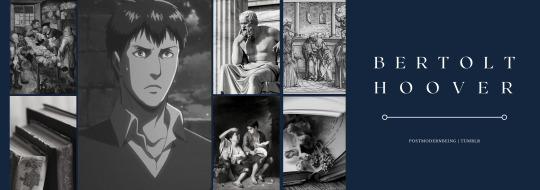
Bertolt Hoover
History of mentalities / Les Annales
Intimate relationships, basic habits and attitudes. / Culture
Bertie has always been a much reticent and shy guy. As he grew up, he consolidated his sullen personality, but maintained a friendly attitude towards anyone who needed him. That’s why he thought that the priority in his studies was to be at the service of his classmates.
So, although he was passionate about research and was a fan of the French Les Annales current, he considered his mission to be in the Archive. As a cataloger, organizer and curator of ancient documents.
But the ways of History are always mysterious, and Doctor Magath showed him that other way of being was possible. Before Bertolt picked his specialty, he met Theo Magath, a professor who recently had finished writing a book: “The Idea of Death in Liberio’s Ghetto in Marley During its War Against Eldia (Paradis)” (long-ass titles are historians specialty btw). After Magath ended his book’ presentation, Bertolt reached him. They talked for hours and finally, he felt inspired into pursuing his true passion. Magath gifted him “The Historian’s Craft” by Marc Bloch as a way to reminding him his way.
By the time Bertolt took History of Mentalities as optional class, he already had some basic notions about Les Annales, Lucien Febvre, Marc Bloch, Fernand Braudel, Jacques Le Goff and such.
Being the gentle giant he is, Bertolt finds joy in reading about different lifestyles in diverse cultures. He constantly wonders about the origin of social constructs and the way they shape thinking as much as identity.
This boy is a wonder, he might not be the best in oral presentations or extracurricular activities but sure as hell he’ll graduate with honors.
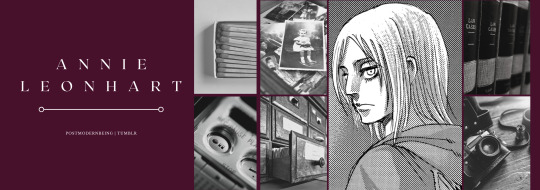
Annie Leonhart
Oral history, about institutions. Particularly, police and justice system in early XXs.
Albeit she got into the same University than Bertolt and Reiner, even shared classes and hopes, Annie regularly felt disconnected from her studies. With time she realized it wasn't due her career itself but rather because of the currents that her professors had suggested her taking. Until now.
Talking with Hitch and Marlow about their doubts concerning subjects and departments it came up the topics of history and present time but also oral history. She’d never heard something like that before. So, that very same week, Annie started searching for information about that.
She ended up with more questions: is it all of this just academic journalism? Or maybe sociology? When we can talk about regular history and when it starts being present time? If she introduces interviews due oral history, then that makes it an interdisciplinary work? Which are the best systems for analyzing data? Definitely, she’ll need help from anthropology and sociology departments if she wants to keep going.
Contrary to her initial prognostic, philosophy and history of historic writing became her new allies, and the text “Le temps présent et l'historiographie contemporaine” (Present Time and Contemporary Historiography) by Bédarida among others, provided Annie another perspective.
Regarding her favorite topics, she wouldn’t say that she selected them freely. They were just practical preferences. For institutions own extensive archives and numerous functionaries. One way or another, she ended up tangled in judicial system and police issues.
With new tools and object for studying, one could find Annie having a blast as detective too. Even if her academic essays focus on institutions’ history and configuration, she’s also working in corruption and more. She doesn’t do it because she believes it’s the right thing, but besides, the thrill of the tea is spicy. Although she won’t admit it.
#shingeki no kyojin#attack on titan#aot headcanons#snk headcanons#eren jaeger#mikasa ackerman#armin arlert#jean kirstein#marco bodt#sasha braus#connie springer#historia reiss#ymir#reiner braun#bertolt hoover#annie leonhart#modern au#college au
91 notes
·
View notes
Text

1883magazine.com
Darren Criss
On his new EP ‘Masquerade,’ the multi-talented Darren Criss welcomes everyone to the party.
Throughout his career, Darren Criss has never been one to shy away from boundaries. As an actor, he has won numerous awards and critical acclaim for his portrayal of Andrew Cunanan in Ryan Murphy’s award-winning drama American Crime Story: The Assassination of Gianni Versace, as well as hearts and a cult-like following for his portrayal of Harry Potter in Team Starkid’s A Very Potter Musical. As a musician, his talent shows the same range; he is as well known for his ability to belt a broadway ballad as he is for his covers of Top 40 hits on Glee.
For Criss, this is because all music is simply music. Musicians and listeners alike need not box themselves into certain genres and while this concept is currently growing in mainstream media, it is one Criss has known since he was a teenager. At Warped Tour, he encountered fellow San Franciscans Me First and the Gimme Gimmes, a punk-rock cover band that specializes in the unexpected (their most played track on Spotify is Country Roads.). Inspired by what he’s always known was possible, Darren’s career has had freedom most artists take years to explore — and with his new EP, it’s clear that is the most recent chapter.
‘Masquerade’ is an exploration into Criss’ more eclectic side with each track on the record representing a different persona or masque for the artist. The overt character-driven quality of the EP lends not only to allowing fans to learn more about Darren Criss, but also to create a project where something can be found for everyone.
1883 Magazine spoke to Darren Criss about his perception of genre, his new EP, and the curse of creative people.
Congratulations on ‘Masquerade’. I love it. It’s so fun!
Fun is a very fair adjective, I would agree.
I feel like there’s a very cohesive vision or aesthetic to it. When you set out to make the project, did you have this end goal in min or were you just making music?
Yes and no. First and foremost, when you’re dealing with the whole of what an artist does, there are so many different facets that make the whole piece. To start, I’m just a songwriter — that’s the main thing that seeds everything else. But, because I’m a creative person, I’d like to think that I have a somewhat cohesive vision for my projects. However, you can conjecture and pontificate over what you want to happen, but ultimately a project is going to come out how it does. The thing that ties it all together, hopefully, is the artistry of the music or the person’s voice. When I heard you say “cohesive” my mind was like, “Phew!” Because we’re all scatterbrained people and we just constantly pray other people somehow think that we planned something or we had it envisioned all along, so to hear that is an enormous relief.
That being said, I had hope for how the EP would come together. I’ve been leaning into this notion of a character-driven song. The dirty secret about that is all songs are character-driven; all art is character-driven in some way or another. I just use that wording to aide folks that might be perceiving me as an actor and to apply that methodology to music.
How so?
I always thought it was a bit of an unfair double standard — where actors can be in a horror movie or romantic comedy — and we’re still behind that person as an actor. Actors can put on a prosthetic nose or a wig and do different things to service whatever story they’re doing. Historically music has been a little trickier, but now I think that’s changing. I’ve always been a self-proclaimed genrephile. I love so many different kinds of things. Growing up it was difficult for me to really assert this without confusing people. Now, that kaleidoscope has shifted in my favour, because people are more into eclecticism and musical diversity due to playlist culture and the whole homogeneity of everything. I’m employing this notion of being an actor and being behind a character and applying it to music by treating each song as its own kind of character. I want the art to correspond with that.
That’s an interesting concept to apply to music.
I know that everything I just said is horrifically more cerebral than it needs to be. If you like the music and it’s fun, great. I’m just trying to help people out that might be confused by perhaps some of the cognitive dissonance that’s happening between some of the styles. At the end of the day, it’s an artist’s voice, literal singing voice, and heart voice — what they have to say and how they say it — that tie everything together. People are more accepting of that than they used to be. This is exciting for me because I finally got to lean into something that I’ve always leaned into my entire life.
The last EP you released was ‘Homework’ in 2017. How do you think you’ve grown as an artist since then?
For me, obviously, there’s personal growth and professional growth. I think my growth is much more technical — getting better at recording music or being able to translate abstract ideas into physical recording — the things that I don’t think necessarily would be seen on the records. Again, much like an actor, ‘Homework’ was me playing the part of making a very low-key, singer/songwriter record. I’m a big believer in dressing for a party. I had some singer/songwriter songs that I wanted to honour. Each record I release shows a different version of myself that I haven’t gotten around to sharing.
The songs on ‘Masquerade’ are not like, “oh man in the past few years, I’ve suddenly become this person.” The EP was me finally getting in touch with my more Garage Band musician roots that I hadn’t been able to flex. It made sense to me to finally make this music. I had linked up with people that I thought could help me bring it to life in a way that hadn’t been done before and I felt like the timing was right. As I mentioned, it seemed like audiences might be a little more privy to this kind of thing.
I don’t want to be so stubborn as to think that there hasn’t been growth. I’ve been so lucky as an actor, that I’ve been busy as an actor. The only obstacle to me putting out more music, which I wish I was doing all the time, is time. I’m not an artist that just shows up, sings, and checks out. I’m writing, I’m producing, and I’m really in the weeds. It takes a great deal of investment, emotionally and mentally when I make music.
So, when you say, “you wish you were always releasing music,” do you mean to imply you have more music or at least ideas for more music?
I think the curse of creative people is that our ideas move faster than our bodies can execute. What this inevitably will create is a huge queue of unattended things that you will always be haunted by. From there, you have to catch as catch can. At any given moment, there’s still so much more in the queue that I want to put out. It literally took a global shutdown for me to finally have the time to look at the said queue, and say, “Okay, which project do I not only really want to do, but also do I have the resources to do and do I think fits into where I am right now?” Because I’m very cognisant of l where I am in my career. I have this huge selection of songs and when I have the time to focus on music, I go through and pick the ones I think fit where I am mentally and how I think other people are feeling.
With all these different genres of music you’ve released and all the music-centric projects that you’ve been a part of, is there a type of music that you enjoy performing the most?
I would say everything, but I don’t mean that in a way to just include everything. By nature, I’m a dot connector; I like shortening the distance between two things as much as possible and showing people how they can coexist. It’s my MO personally and professionally. Genre, while it has a lot to do with the cultural background and history of a type of music, is the boxes that we’ve arbitrarily made up to categorize and market music. I’m completely nondenominational when it comes to genre because all I can hear is chords, melody, and lyrics. It’s never been separated to me. When I’m performing live, I relish getting to lean in and bring together genres. I love using the setlist to show an audience how similar different genres are. For example, I’ll play a punk rock song and right after that I’ll sit at the piano and sing a ballad. My voice will be a little different, but it’s still my voice. Just like in acting, no matter what character an actor is portraying, it’s still their face and their body. Trying to minimize a distance between genres when I perform is an exciting prospect because I like getting audiences to rethink what they think they know about the differences between genre and how really at the end of the day it’s all just storytelling. So…I like performing it all.
I didn’t say you couldn’t say you liked everything. [Chuckles] That’s a perfectly acceptable answer.
I like putting all of it together specifically to show the similarities. Historically, all the great steps forward in a new kind of art form have been by mashing two or three seemingly unrelated things together. It’s happening constantly. It’s happening right now. Culture is a constant conversation back and forth. It’s a sharing of ideas that ebb and flow to create something new. I’m not saying that I’m taking part in this ancient conversation, but I’m certainly enjoying it. When I see pieces of it that I would like to showcase, I jump at the opportunity to do so.
Since ‘Masquerade’ has been in your creative bank for a while, what would you say inspired it?
Every song has its own inspiration. The album doesn’t really have an inspiration. If anything, I’m trying to make sure that I can show up for myself. I feel like with everything that I’ve done musically, I haven’t gotten to represent who and what I am and what I do. To me, this EP gets me closer to that goal. I still think that only a small percentage of me has been represented and that’s just because of time. I haven’t been able to focus on music in the way that I’d like, but ‘Masquerade’ is a huge stride for me.
Speaking of you being on Broadway, Elsie Fest is Sunday! On top of it just being exciting because it’s back, it’s your first public gig in almost two years. What did you miss most about the festival?
Listen, even without a global pandemic to worry about, putting on a music festival is hard enough. It’s one of my favourite times of the year because I’m very proud of what we’ve built and what we’ve continued to build and expand upon over the years. There’s been a community that has been built around not only people that come to the festival but people that have been part of it. I’ve followed these performers’ careers and I’ve been really grateful that we got a piece of their magic and got to be part of their journey at Elsie Fest. Magic which I can’t take credit for. I just lucked out with having incredible people perform. Over the years, we’ve had Cynthia Erivo perform twice. The first time she premiered a song called ‘You Will Be Found’ from a musical that would open in a year called ‘Dear Evan Hansen.’ We premiered a song from a movie called ‘The Greatest Showman.’ Keala Settle went on to win a Golden Globe for that song. Last year, we had a young girl from Disney sing for us — her name was Olivia Rodrigo. Those are just three examples. There’s been a lot of people that I’ve been thrilled to see do their thing. This year we have an incredible lineup. Barlow & Bear are coming, along with Jordan Fisher, Adrienne Warren, Pentatonix’s Kirstin Maldonado, and Alex Brightman. It’s gonna be great.
The obvious and the biggest answer is getting to perform live within as much of a safe and comfortable environment as humanly possible. Luckily we’re an outdoor festival, so that’s already to our advantage. I will be performing this new EP, but there is also a lot of music to catch up on and a lot of music I want to share. I’m mainly excited to share it with other human beings. I look at performing as a service industry. Everything that I do isn’t worth a whole lot unless other people experience it because it takes on a life of its own. The audience is not there for me & I’m there for them. I’m trying to service an experience that’s bigger than both of us and create something that couldn’t have been there if both parties were on their own.
Before I let you go, I need to tell you that Tramp Stamp Granny’s is one of my favourite bars in LA. I’m obsessed! I haven’t made it back yet. Like I said earlier, the editor Kelsey is also one of my best friends and when she comes, it’s top on my list of places to take her.
Really?! That makes me so happy. You couldn’t have said a better thing. We’re open again to limited capacity. We require vaccinations cards at the door and we’re only open Thursday-Saturday. Talk about being with people — the night we reopened, about a month ago, I got pretty emotional. It was nice to see people just being happy to sing and celebrate life with strangers. That was a really encouraging sentiment because despite the use of digital communication which I do think is an amazing thing, we, so clearly, inevitably, yearn for each other. Despite everything, people were coming to the bar and were so happy to be there and be around other people. Our need for other human beings is a constant that is extremely encouraging to me as a bleeding heart idealist. It’s nice to be a small part of that.
Finally, you said earlier Barlow and Bear were going to be at Elsie Fest. I cannot wait for the Unofficial Bridgerton Musical and was so excited to see you’re involved.
It’s cool meeting them because in a much more organized and impressive fashion they’re doing what my friends and I did ten years ago with ‘A Very Potter Musical.’ They are insanely talented and deserve to be the huge phenomenon they have become. They’re the future. I’m trying to grab onto their coattails however I can. [chuckles] They’re just getting started. I’ve been a big fan of Emily’s for a long time. She hates it when people say this, but [mock yells] she was a child prodigy and she still is. She’s an amazing human being.
Masquerade is out now.
Follow Darren Criss @darrencriss
Interview by Sydney Bolen
#darren criss#1883 magazine#elsie 2021#masquerade ep#tramp stamp granny's#homework ep#press#august 2021
33 notes
·
View notes
Text
There’s No Business Like Show Business: Chapter 5, Part 1
T/N: This is one super-long chapter ( ; ω ; ) so it has been split into 2 parts.
One week later. This was the night Maya’s company had been invited to perform.
The West End of London, stretching from Soho to Covent Garden, was renowned for its large theatre district, crowded with historic names such as the Theatre Royal, Drury Lane, Haymarket Theatre, and St James’s Theatre, in addition to newer entrants. [1]
Right in the centre of the district was Piccadilly Circus. At this time in history, the “Eros” fountain had yet to be built [2]. Here was the intersection of numerous thoroughfares, with pedestrians and horse-drawn carriages coming and going, day and night — the busiest spot in London.
It was here that a certain elderly noblewoman drove past in a carriage. But the next moment, she saw a strange sight in the middle of the square, and ordered her coachman to stop the carriage.
“……My word, what could that be?”
The words fell from her lips.
In the centre of the square was a simple stage about ten metres wide, composed of wooden boxes placed together and covered with boards. Passers-by had stopped to look out of curiosity, and a small crowd began to form.
After a short while, a lone woman appeared on stage.
She wore a sky-blue dress and a long, blonde wig. The crowd stared blankly as she gave a reverent bow.
“——Ladies and gentlemen, good evening. We are a small theatre company hailing from the East End. I am Maya, its chairperson.”
She raised her head, and gazed upon the whole of Piccadilly Circus.
“You may be feeling confused as to why a stage has suddenly occupied the Circus, but first, let me express our deepest gratitude that we, a theatre company of humble origins, have been able to meet you in this miraculous way.”
Her dignified voice resounded across the square, causing a stir among the onlookers. As more people noticed what was happening and gathered in droves, the crowd encircling the stage gradually expanded.
“Without further ado, let us bring you a little dream in a fantastic world.”
Maya ended her introduction with a graceful bow. Then, a man appeared on stage. Facing the crowd, he began to speak in a sonorous voice.
“It was a radiant afternoon filled with golden sunshine. A boat cruised leisurely down the river. Small, young hands gripped the oars. They seemed to lack strength: rising nimbly, then falling left and right as if to guide the oars’ movements.”
“……Hmm?”
The crowd listened intently as he narrated, with accompanying hand gestures.
“Oh, how terrible: what a cruel fate this is, to meet three girls! I’m all warm and sleepy. But still you wish to talk to me! You move my feathers, and do not breathe. But I’m all alone. I’m no match for the three of you.”
“This— Could it be……?” someone in the audience murmured.
With his monologue complete, the man took his leave. Then, another woman appeared at a corner of the stage. Holding a book in one hand, she began to read fluently from it.
“Alice was beginning to get very tired of sitting by her sister on the bank——”
In tandem with the narrator’s words, the blonde-haired Maya gave a small yawn. It was as if she had swapped places with a young girl herself. Without realising it, the audience held their breath.
Then from the side of the stage, a person appeared wearing a vest and rabbit’s ears, with a pocket-watch in one hand.
By this time, the crowd encircling the stage had become fully spellbound.
✦ ✦ ✦ ✦
“——All the world’s a stage. And the men and women merely players.” [3]
An actor delivered his lines from the stage of a gorgeous West End theatre, as its owner, a nobleman, looked on from the box seats.
The actor himself knew the height of his fame, and hence his actions were somewhat egotistical. Nevertheless, these were the acting skills of a true professional: his clear, bright voice resounded in every corner of the intricately decorated theatre, delving into the ears of his audience, and producing an indescribable feeling in their chests.
His salary was eye-wateringly high, but evidently, it had been an excellent decision to hire this actor. Still, despite his self-satisfaction, the nobleman had a pained expression.
The reason for it was clear. This was a renowned theatre company famous for its acting talent. Even though it was their opening night — a momentous occasion, the stalls were unusually empty.
He’d made sure to advertise the play well in advance, so this was unexpected. As he admired the actors, who were not bothered in the least by the empty seats in the audience, the nobleman stood up and headed to the entrance.
“Hey, you. Haven’t there been any more visitors?”
He directed his question to the young man behind the ticket window.
“About that— Just a while ago, it seems a show’s begun at Piccadilly Circus.”
“A show?”
“Yeah, though I heard about it from someone else. A stage suddenly appeared in the middle of the square, and it looks like there’s a play being held. It’s about…… that; the one where a girl chases a rabbit and falls down a hole, uh……”
Those keywords alone led the nobleman to the answer.
“——Do you mean, ‘Alice’s Adventures in Wonderland’?”
The young man clapped his hands in appreciation.
“Oh, that’s right. Yeah, that.” He sighed wistfully. “Ahh, it brings me back: I read it when I was a child. And as I recall…… was it ‘Maya’? It seems that’s the chairwoman’s name.”
“Wha……!”
Upon hearing that name, the nobleman recoiled in shock.
“That theatre company from the slums?”
A play held on a stage that appeared out of nowhere. The young man saw it as a mere street performance, but to the nobleman, this was something different. As soon as the image of the perpetrators surfaced in his mind, his face turned red with anger.
An extraordinary turn of events, happening right on the opening night of an important production — as if it had been carefully planned to do so. In other words, Maya and her company had intended to sabotage his production out of spite, by putting up a play out of the blue, and not even in a proper theatre. That was what the nobleman concluded.
To add insult to injury, they had chosen to perform “Alice’s Adventures in Wonderland”. To stand up to a classic with a piece of children’s literature. To pit Lewis Carroll against Shakespeare.
Although it was a ridiculous idea worthy of scorn, the fact remained that they had stolen his precious audience.
He posed a question to the young ticket seller.
“Well if that’s the case, wouldn’t there be a huge commotion? The Yard should be on to them any moment now.”
“That’s the thing…… It seems they’re already gone.”
Hearing that, the nobleman threw his head back in laughter.
“I told you so. It’s all because they’re out of their depth. They can recite their lines in jail for all I care.”
However, the young man made a troubled expression.
“Uh…… Sorry. I didn’t make myself clear. Actually it seems that after finishing one scene, they specified a different location, packed up their sets quickly and left.”
“……What?”
✦ ✦ ✦ ✦
“You ought to be ashamed of yourself, Alice; a great girl like you, to go on crying in this way! Stop this moment, I tell you!”
Behind the church of St. Martin-in-the-Fields, in Trafalgar Square, Maya and her company acted out the scene in which Alice shrank and grew larger, panicking all the while. The front of the stage had been covered with a white cloth, and a light shone on it from the back, allowing them to show the changes in Alice’s size in the manner of shadow puppets. As Alice grew until her head struck the roof, the audience buzzed in excitement.
Watching from the wings of the stage, Bond could see that everything was proceeding smoothly.
His plan to demonstrate the true abilities of this company, was a moving theatre that roamed all around the city of London—— a “guerrilla theatre”.
They would perform in busy areas to attract people’s attention, then quickly cut off their act and leave before the authorities arrived to stop them. After which, they would continue the performance at another location. One could say this method was the exact opposite of performing in an officially-recognised theatre.
There was a reason why they had changed the contents of their play. As their original performance comprised three short stories, there was a concern that the audience would grow bored after watching just one scene. However, staging a full-length play across various locations would keep up their interest for the next scene.
In addition, “Alice’s Adventures in Wonderland” took place in a nonsensical, chaotic world, with no apparent connection between its acts. As a well-known story in itself, anyone joining in halfway would still be able to enjoy their performance — a perfect work to be presented in this manner.
The main issue was the acting, but that was helped by their practice in performing on a big stage.
As part of this plan, the play they would put up was not of the type that drew the audience’s attention to the stage right from the start, but rather one that was performed outdoors to people passing by. Hence they would have to project their voices and exaggerate their actions, but this was simply an extension of the two weeks’ practice they had done before.
Moreover, Maya and her company had extensive experience in performing children’s literature, with a focus on ease of understanding, so much so that they had almost learned the entire tale by heart. Memorising their lines had been no trouble at all.
Furthermore, the preparations at each of the locations they moved to — the very heart of the operation — were borne by the East End residents, who appreciated their performances.
The plan inevitably required manpower, but there would be no point in Bond providing it. However, with the trust of their fellow residents, Maya and her company had managed to recruit the stage crew by themselves. This achievement was their own.
As the company performed in one location, the stage crew would set up the temporary stages in the other locations across the city. They had accepted the company’s request with pleasure, and Bond couldn’t thank them enough for the depth of their kindness.
As he looked upon the crowd, all standing with eyes locked upon the stage, Bond chuckled.
——Even without a theatre, there would always be a place for acting.
It had been a wild idea to turn the city of London into their stage. But the East End residents lent them their support. And Maya and her company were putting up an excellent performance.
In a manner of speaking, this play was an all-out challenge from the people from the East End, to the gilded theatres of the West End.
Ten minutes till showtime. The players announced the location of their next act, then quickly descended from the stage.
“I’ll be leaving the cleanup to you then,” Bond addressed the remaining crew at the square. Then he directed the actors to board the carriages he had prepared. Taking the reins of one himself, he urged the horses forward in a gallop.
“Um, we owe it to you that our audience has enjoyed our play thus far, but…… I’m not sure if we can continue to do so,” Maya asked with a worried look.
Hearing that, the other actors in the carriage, who’d been going over their lines, turned solemn.
Although things had been going well so far, if their acts attracted too large a commotion, it stood to reason that Scotland Yard would put its full attention into stopping the play. Moreover, bad actors may also seek to take advantage of the hubbub. As far as possible, they wished to avoid their audience falling victim to crime.
Bond fully understood their apprehension. Because of that, he kept calm as he reassured them.
“Not to worry. I have some dependable colleagues.”
Saying that, he gazed in the direction the carriage was going, and smiled.
“It’s a popular saying, isn’t it? The show must go on.”
The curtains had been raised. Now all that was left, was to play their roles to the end.
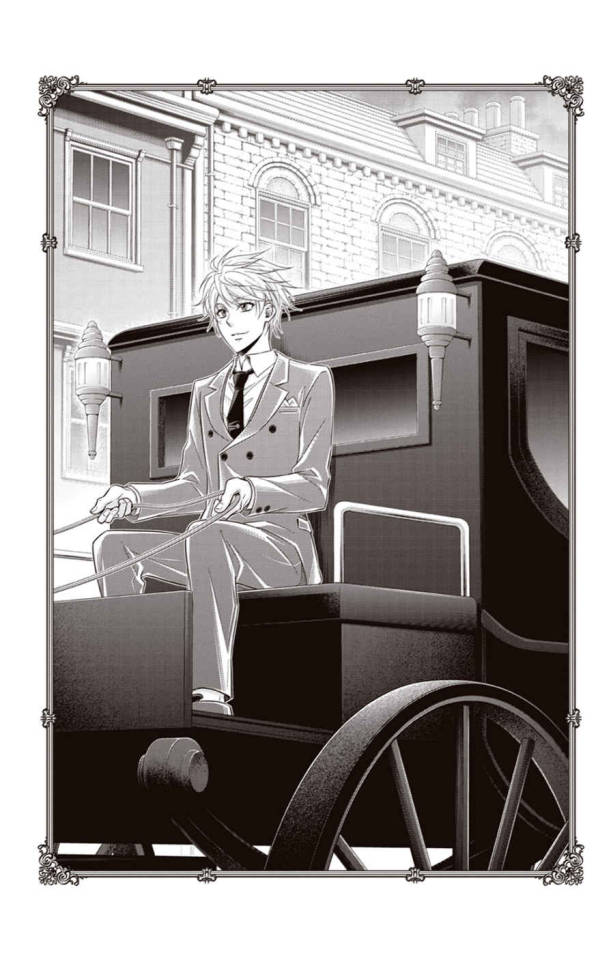
Footnotes:
[1] This district is known as Theatreland (Wikipedia). The first two theatres listed are still standing, with St James’s Theatre having been demolished in 1957.
[2] If you were to go to Piccadilly Circus now, you would see a very prominent bronze fountain with a statue of a winged angel on top. Actually, the statue isn’t of the Greek god Eros at all. (Wikipedia)
[3] A line from Shakespeare’s As You Like It (Wikipedia).
Translator’s notes:
Quotes from Alice in Wonderland All dialogues from the East Enders’ production have been heavily referenced from the Project Gutenberg version of Alice’s Adventures in Wonderland, by Lewis Carroll.
Thinking about what year the series was set in In this chapter, we learn that the “Eros” fountain hasn’t been built yet — it was unveiled only in June 1893. But we know some events of the Phantom of Whitechapel arc, such as when the people of Whitechapel formed a militia, did take place in history — these were broadly in the autumn of 1888. So this actually works out, and gives us a sense of when the events of the manga unfolded.
Edit: The manga seems to be canonically taking place between 1879-1882 latest — you can read my analysis here!
Piccadilly Circus in 1868 This is entirely for fun — here’s a screenshot from the game Assassin’s Creed: Syndicate (set in London 1868), with Evie standing at Piccadilly Circus:
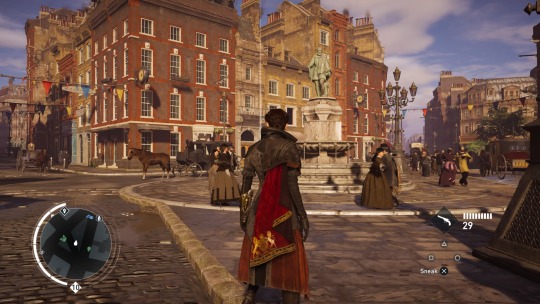
I couldn’t find any pictures of the Circus from before the “Eros” fountain was built, but in Yuumori’s time, it would’ve still had the circular shape shown here. When Shaftesbury Avenue was built in 1886, it transformed Piccadilly Circus from a circle into the sort-of trapezoid crossroads layout it has retained today (British History Online).
#moriarty the patriot#yuukoku no moriarty#yuumori#english translation#forbidden games#illustration insert
74 notes
·
View notes
Text
Response to the Moral Question of the MugenxFuu Romance
This is a full response to an anonymous ask I received:
“Can I ask why you ship fuugen? Isn’t Fuu a minor and Mugen is 19.”
This is a rather...complex and loaded question. There’s multiple things to address but I’ll start simple and work up from there. I will first go into my personal feelings on why I ship the pairing, evidence, and then the more complicated concept of the character’s ages both in reality, as well as in the fictional anime. Hopefully it will alleviate some distress on the issue. If it doesn’t, and you consider the age gap morally unacceptable, then it might unfortunately serve to make Mugen out to be a morally questionable character, implied romance aside.
The Simple Question: Why do I ship it?
I ship Mugen x Fuu because it’s implied canon by the creators.
I believe strongly, and have found and provided plenty of evidence in my numerous other posts that support my belief, that Mugen and Fuu were written to have romantic feelings for one another. These feelings were never addressed, acted upon, nor explicitly spelled out for viewers. But the subtle implications of their unsaid feelings added up, episode by episode. The interviews of Shinichiro Watanabe, Ayako Kawasumi and Ginpei Sato only solidify my interpretations and findings.
The actual anime aside, here are the links to my posts concerning the interviews, if you are interested.
-Shinichiro Watanabe about Mugen’s Character.
-Ayako Kawasumi and Ginpei Sato about Fuu’s Feelings for Mugen in the Roman Album.
I adore the entire cast of Samurai Champloo, as much as by themselves as I do as a trio. I love Jin just as much as Mugen and Fuu. However, I do not see any implication of Jin having romantic feelings with either of them. His romance is canonically with Shino and his role for Fuu feels more brotherly and fatherly to me.
Personally, I am not a “crack shipper”. I am not someone who typically likes two characters and pairs them off together for my own amusement. I have nothing against crack pairings, nor their shippers, but it is not my taste. I enjoy romances that have some type of evidence or backing behind it. So it is not as if I simply ship Mugen and Fuu because I like Mugen more than Jin.
If hypothetically, all the things that happened with Mugen and Fuu happened with Jin and Fuu—if Jin saved her constantly, if Jin and Fuu had strange, intimate moments like the wrist grab scene, if Fuu jumped in the way to save Jin’s life, if Fuu cried for Jin seven times, if Fuu’s voice brought Jin back from death, if Jin gave up his sword for Fuu—well, I would not be a fan of the Mugen and Fuu ship. I’d be a fan of Jin and Fuu.
But that is simply not how the anime was written.
On that same note of liking an implied romance, I am not as interested in blatant romance stories either. Implied, subtle romance is so interesting because it leaves enough clues that one has to find themselves, and then you are able to make your own interpretations and “what if” scenarios surrounding it. This is why I enjoy the story types of, say, the Souls video game series and its related titles. (Demon’s Souls, Dark Souls, Bloodborne, Sekiro). The story lines have to be figured out, and while there is evidence and clues dropped all over, nothing is ever specifically stated. But even so, we can come to solid conclusions that are difficult to disprove, but also never fully confirmed.
Samurai Champloo spells out very little for viewers. Example: Never does the anime state what island Mugen is from. We only know it’s in the Ryukyus. But based on historical evidence, and also symbolism in the show (the paantu and the trees in his flashback) we can assume it’s Tarama-shima or another island in Miyako.
Never do Mugen and Fuu state they have feelings for one another, but it’s in subtle dialogue, numerous times. Most blatant however, is when Sara tells Mugen “It’s as if you’ve never been loved by anyone.” and then Fuu proves her wrong by saving his life by throwing her own in the way, only seconds later.
Their actions fascinate me. Both Mugen and Fuu demonstrate self sacrificial behavior for each other, and show how much they care with actions rather than words. Most of all, I enjoy the romantic trope of “love leads to a character’s redemption.” Mugen’s feelings for Fuu is what redeems him from the sins of his past, and saves him from a life without meaning and only pain, anger and hatred. These aspects of his dark character are highlighted both by the dialogue of Mukuro in Episode 13 and Sara in Episode 21. Fuu being his redemption is also symbolized in her saving him on three separate occasions. The last incident, when she calls him back from death and the Paantu taking him away, is the most symbolic of his “redemption”.
Samurai Champloo is a direct response to the cynicism of Watanabe’s previous work, Cowboy Bebop. Where revenge and the past consumes Spike, ruining his future and love, Mugen is redeemed by love and is able to face his past and press on.
Here is a fantastic article about the concept of Mugen’s love for Fuu being his redemption and also being a direct response to Cowboy Bebop.
All of this aside, because of the second comment, I’m assuming that this isn’t necessarily what you were asking.
“Isn’t Fuu a minor and Mugen is 19?”
I’m guessing you’re implying that either the romantic pairing is impossible due to their age gap, or it’s morally wrong.
I was conflicted how to answer this, at first. I know this can be a triggering topic. So I decided on providing several explanations. I hope at least one answers the question properly, or at least sheds some light on the issue.
Either it will justify why there is nothing morally reprehensible about the Mugen x Fuu romance, or, it will unfortunately show that Mugen is morally questionable, depending on how the evidence is taken.
First, at 15, Fuu is not a minor in her time period. Second, Mugen is either 19 or 20 depending on the source.
Samurai Champloo is not set in one specific year of history, as the anime is not only anachronistic, it historically takes place in multiple years that could not coincide. In essence, Samurai Champloo is not one year, but “a chanpuru of one whole era.” This era is the Edo/Tokugawa era, which includes the years of 1603-1868.
In the Tokugawa Era, Fuu is considered an adult. She is a young adult, yes, but in the eyes of everyone, she is an adult. This is both historically accurate, and is also demonstrated numerous times in the anime. Fuu’s sexualization and her being seen in a romantic way is never frowned upon by any of the characters in the entire series.
Brief disclaimer: Nowhere in my love of the Fuugen pairing or fan interpretations of the characters’ futures, do I see any sort of sexual relationship between Mugen and Fuu developing when she is 15. After they part ways, is where I like to make my fan conclusions on them meeting again when she’s older.
I also want to clarify here and now, that I’m not a supporter of a 15 year old entering a romantic relationship of any kind, let alone a sexual one in real life. I think that teens should work on themselves and not get swept away by romance and sexuality, especially frivolously. It’s irresponsible and dangerous. But, it’s also unrealistic to believe all young people will never fall in love, whether it’s fake or real. If there happened to be a man who was 5 years older than a girl and the two did develop feelings for each other, I believe nothing should be pursued between them until they are both of age.
Adulthood in the Tokugawa Era
I want to first talk about the concept of Fuu being a minor. In short, she is not a minor in her time period.
To begin with reality first, the life expectancy hundreds of years ago was much lower than now. In Japan now, the average life expectancy is in the 80s. But hundreds of years ago, it was estimated to be about 50. Women in particular had the complication of fatality from childbirth. Led makeup, childbirth, and also STDs were a huge threat for courtesans of the time period as well. Many women died in their twenties.
As for the concept of ”adulthood”, the adult age of 18 only started in the Meiji Restoration (late 1800s- early 1900s) when Japan contacted the west and emulated its practices. The age of 18 being an adult nowadays is largely based on the setup of the education system. Whether 18 is too young or too old is a matter up for debate and varies country to country.
Specifically, in the Tokugawa Era, the age of adulthood was considered when one entered puberty. This was generally 15 for a male and 12 for a female.
Here is a link to the full article on the topic of the shifting coming of age, if you are interested.
In the case of aristocratic children, such as boys raised as samurai, the Genpuku ceremony that transitioned children to adults varied in age. During the early Tokugawa era, it was 15-17, while later into the Tokugawa era, during less civil unrest, the age dropped to as low as 13. At this age, these young men could then marry and were likely pressured to do so. Marriages in the Tokugawa Era were very different than nowadays as well. Many nobles and royalty had their daughters married off at young ages such as 8 years old.Though, the sexual nature of these relationships did not develop until the girl was likely of child bearing age, which was in the teens.
Taking the historical 12 year old age into account, Fuu being 15, is then already three years into adulthood.
Fuu’s Depiction as a Woman in the Anime
In regards to Fuu’s maturity, she has no guardian, nor caretaker, which shows she is an independent adult making her own decisions. Yes, Mugen and Jin are her bodyguards, but they are not her legal guardians, because she does not need one. It is her who commands them and leads them. After they part ways, she is fifteen years old (perhaps a year older based on the time span of the anime) traveling the country alone.
She was forced to grow up very fast. Not only is she an orphan, but Fuu’s resourcefulness allows her to survive on her own. She tricks two complete strangers to escort her across Japan. But Fuu is fully functional as an adult, arguably more than Mugen or Jin in some ways. She works, fishes, cooks, sews, tends to wounds etc. Fuu is by no means innocent to mature situations either. She’s seen Mugen and Jin kill numerous people in front of her, which is traumatizing in itself.
In regards to Fuu’s sexualization,on separate occasions, there are bath scenes in the anime, showing Fuu partially nude. There are also scenes of her undressing. Morally correct or not, it is clear she was sexualized like many young anime females.
Aside from that, here are examples of male characters viewing Fuu as an adult woman, romantically or sexually.
Episode 3 and 4: Fuu is thrown in a brothel. While the legality of her being forced against her will just for the sake of paying off a debt is somewhat in question, the fact that she is 15 in a brothel is not. Brothels were not an undercover organization. It was completely legal in Tokugawa Japan, and Fuu being 15 as a courtesan was not illegal. When an ugly rodent man buys her, it’s served as comedy.
Episode 5: Fuu becomes a ukiyo-e model, the backwards beauty, for Moronobu Hishikawa, who was a real historical figure. This grown man, probably around Jin and Mugen’s age or maybe older, also is not considered a creep for his attraction to her. In fact, it’s not even considered wrong that he paints a nude picture of a 15 year old. Again, because she’s deemed a woman in this time period.
Episode 8: Nagamitsu, who is leagues older than Mugen and Jin, asks Fuu to become the “harem of his heart”. He is attracted to her, sees her as a younger version of his wife when he first met her, and even asks her on a date, to which she accepts. This entire interaction is played off as comedy, and not that he’s some creepy grown man attracted to a minor. More like, he’s a bumbling buffoon. His two sidekicks, the beatboxer and Ogura do not intervene, nor make a comment that it’s wrong he is interested in a 15 year old when he’s in thirties or forties. Because quite simply, in this time period, it’s not wrong.
Episode 16: Okuru tells Fuu that “a woman with a healthy appetite is a good woman” when she is devouring fish.
If you stand firm that it is still morally wrong and all these characters were creeps for being interested or saying these words to a 15 year old, that is fine. If you think it is morally wrong to ship Mugen and Fuu because of the age gap, and refuse to believe that the two are an implied romance, that is fine too. I can’t convince everyone.
However, I will make the counter argument then, that liking Mugen as a character means liking a morally questionable character. Romance and feelings aside, the reason for this is simply how he treats and talks to Fuu.
Mugen’s Questionable Dialogue to Fuu
If shipping them is wrong, then what Mugen directly says and does to Fuu is just as wrong. In my opinion, it makes it weirder if he doesn’t develop feelings for her.
Episode 2: In the original Japanese dub, Mugen tells an unconscious, intoxicated Fuu that he’s going to rape her. “Okasu kureru” is the dialogue.
The English changes this to “Let’s strip her and dump her.”
Episode 11: When Fuu asks why Jin needs to go see a woman when she’s around, Mugen then responds “Because you’re flat chested”, not to be confused with “You’re a child.” When she says her kimono makes her look slender, Mugen calls her a liar and then says “Show me.” He asks Fuu to undress for him and show him her breasts...
Episode 20: Mugen stands up naked for Fuu in the hot spring even though she’s clearly flustered. Exposing oneself to a minor is an offense in the modern era. But he doesn’t stop there. He berates her, and then peeks his head out to look at her naked too.
All of these examples are meant as fluff and comedy too, no matter how offensive they can be. It also implies his attraction, interest and his consideration that she is indeed a woman. This is then furthered in his dialogue with Jin.
Episode 12: When they read Fuu’s diary, Mugen asks the odd question to Jin. “Man to man, what do you think of her?” This “man to man”, implies Mugen wants to know how Jin feels about Fuu as a woman.
As for a debatable canon example, I have the need to bring up the Samurai Champloo: Sidetracked video game on PS2. In Japanese, it is entirely voiced by the same cast as the anime: Kazuya Nakai, Ayako Kawasumi and Ginpei Sato. In English, Mugen is not Steve Blum, but Fuu and Jin are the same voice actors as the anime: Kari Whelgren and Kirk Thornton.
In it, Mugen develops an attraction to a girl who looks nearly identical to Fuu: brown hair in a ponytail, big brown eyes, pink kimono, three hairpin beads. The kicker is her name is Yuu. The even bigger kicker is that she is younger than Fuu.
Here are the links to the scenes. Japanese audio is much better, as a warning.
Link to English, Fuu catches them alone and tells Jin “I had no idea Mugen was a cradle robber!”
Link to Japanese: Fuu calls Mugen a “lolicon”.
When the girl asks “Do you like me? You can lie if you want.” he tells her:
Link to Japanese: “Suki da. Uso jane.”
Link to English: “I like you. I ain’t lyin’.”
And the two share a kiss, before she dies. Worth mentioning, Fuu also admits to being jealous about all this and a fortune teller tells Fuu that this is her “heart talking.”
While debatable canon, the video game still highlights this concept that Mugen will even like a girl younger than Fuu (anywhere from 12-14), so long as she resembles Fuu.
If we pretend for a moment that Fuu is indeed a minor in her time period, then that makes Mugen’s actions and comments out to be even worse. Not only is he a pervert, but he’s then a pervert flirting and making sexual comments about a ”minor”.
Underaged Girls and Age Gaps in Other Japanese Romances
If you still believe that there is something morally wrong, regardless of the time period it takes place in, I have more modern examples in media.
Modern Japanese shoujo manga and anime (shoujo being a genre directed at teenage girls) is rife with romance stories of older guys with younger girls. It’s not frowned upon in Japan, and even for its readers in the west.
I will give you some major examples I can think of, off the top of my head.
Inuyasha: Inuyasha and Kagome. Inuyasha is over 150 years old (not counting the other 50 years he was comatose). Yes, he ages slower as a half demon, but that is still 150 years of experience in life. Kagome meanwhile, is 15 years old and does not come from the Sengoku era. She’s from the modern era. If one wants to argue that Inuyasha doesn't count because every decade for him is one year, meaning he’s supposed to be “15 in human years”, then there is the matter of Miroku. Miroku is 18 years old, and fondles not only Kagome who is 15, but Sango who is 16. And he and Sango later become a romance.
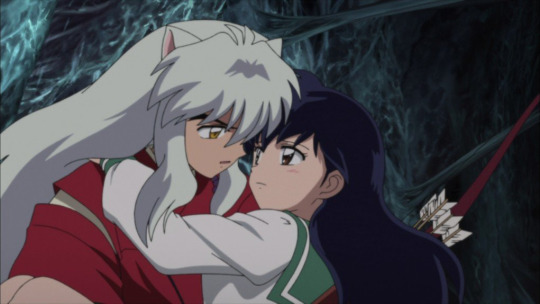
Shugo Chara: Ikuto and Amu have an age gap of 17 and 12. While there is a love triangle element, it is debatable that Ikuto is more her true love interest in the manga. This takes place in the modern era.
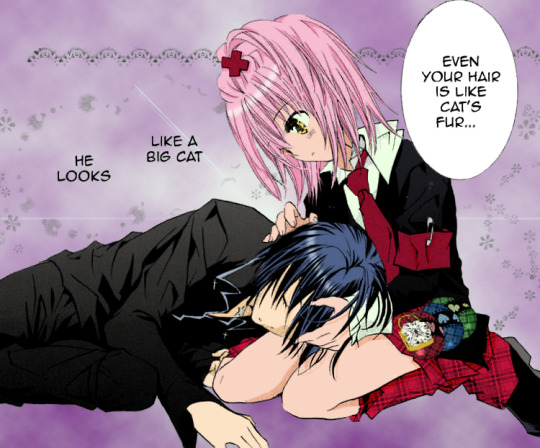
Dengeki Daisy: Kurosaki and Teru have an age gap of 24 and 16. This also takes place in the modern era.
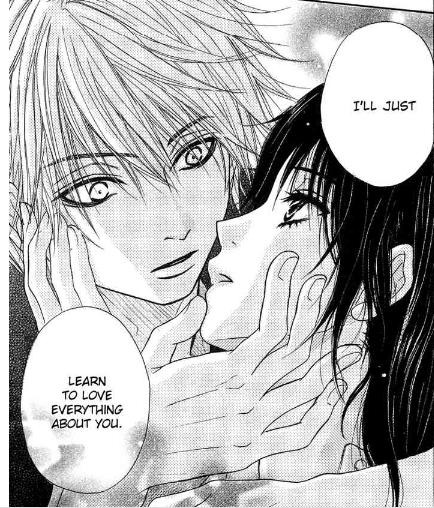
Incidentally, all of these aforementioned romances share some parallels to Mugen and Fuu in some way. Whether the guy is argumentative with the girl, a homeless wanderer, antagonist by nature, teasing about her lack of a figure, a bodyguard/protector role etc.
These are just a few of the more pure Shoujo examples directed at young girls.This does not include age gaps between characters, or underaged girls in anime meant for men or adults in general. They can get far more morally questionable, in my honest opinion. Mugen and Fuu barely scratches a surface. There is clearly a cultural gap between Asia and the West and the concept of age gaps, regardless of one’s personal moral stance on the subject.
Mugen and Fuu’s Actual Age Gap and Maturity
In the Tokugawa Era, their age gap of 4 to 5 years is incredibly small. Even nowadays, that age gap is very small, if Fuu was a legal adult in modern times.
Tsuru-himegimi, the real daughter of Shogun Tsunayoshi was 8 years old when she was married to her husband Tsunanori of Kii, who was 12 years her senior.
As for the anime’s depiction of them, there was never a sense of “Fuu is child. Mugen is a man”. It always felt like the two were in a similar age bracket.
I must ask the question, if Fuu or Mugen’s ages was never revealed, would it change the context of the story at all? If Fuu was older, would it change it? Personally, I don’t think so. In this case, because she is both physically developed and also deemed a woman in the anime and historically, it changes nothing.
Their interactions, their bickering, their attitudes, and the way Mugen yells at her, and the way Fuu reprimands him, it always felt like they were similar. They both exhibited many immature, innocent qualities, as well as adult qualities. It was Jin who had a more mature demeanor, being the calm, responsible one, who would rather not intervene with their nonsense. This is another reason why I see Jin as a father figure to Fuu: a representation of the samurai who smells of sunflowers that she did not have growing up.
These images here show their similarities in behavior quite well. And there are many more examples.
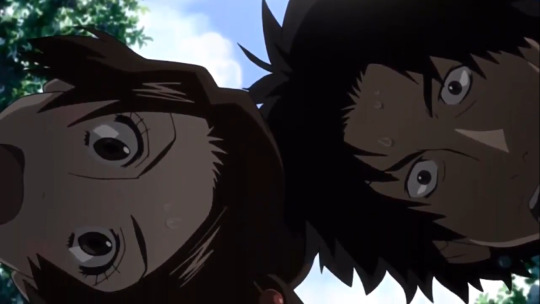
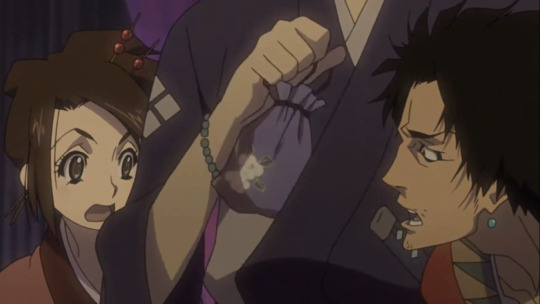
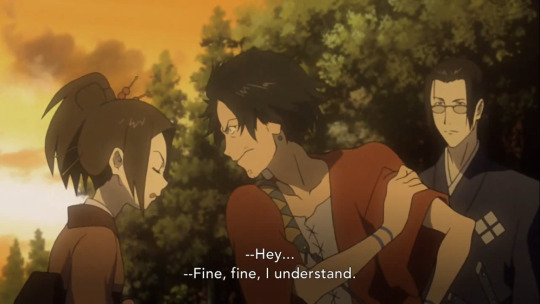
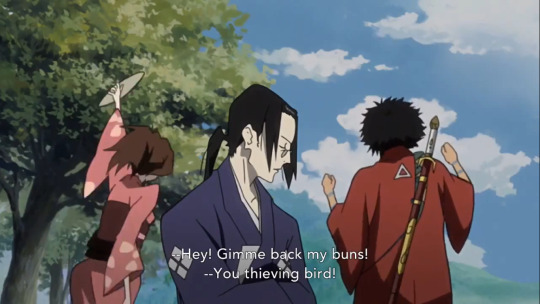
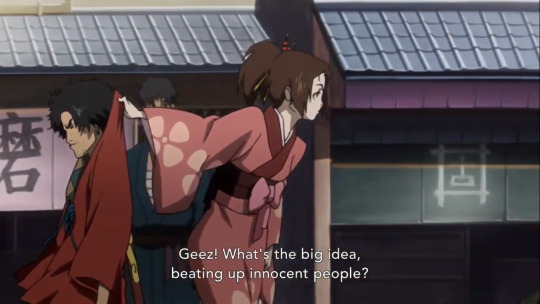
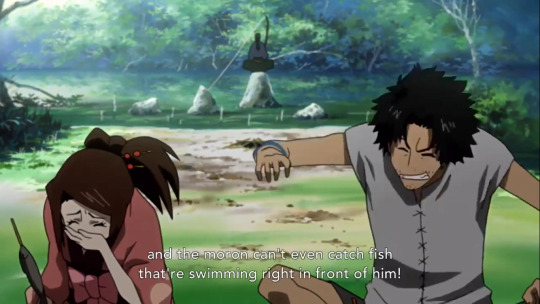
Conclusion
A good, well developed character is not a perfect one. There is no denying Mugen is flawed, morally questionable and sometimes straight out an antagonist. He steals, he kills, he was an ex-pirate who likely raided and pillaged… Realistically, he would have no qualms about being attracted or developing feelings for a woman who is 4 or 5 years his junior, let alone the other crazy stuff he’s done. Especially when, in their time period, there is nothing wrong about it at all.
Regardless if his morality is in question or not, what makes the implied romance so interesting is the fact that he didn’t act upon anything sexually with Fuu. His actions towards her were selfless, and Mugen developed greatly by the end. But because of his actions and words,and jealousy, it does not come off as simply a sibling or familial relationship that the two have. This differs from how Jin and Fuu interact.
Most importantly, Fuu serves as the catalyst for Mugen’s growth and redemption of his sins. Unlike Jin, Mugen saves Fuu time and and time again, making him her hero, despite being seemingly an ex-criminal that only works in self interest. Jin did not require this change, as he was always an honorable samurai from the start.
Both men found purpose for different reasons.
Mugen needed love.
Jin needed duty.
I think that covers everything. Well, unless your question is simply why do I ship them when the characters are young and I’m older than them.
As of the time of making this post, I am a 23 years old woman. The first time I ever set eyes on the anime, I was 8 or 9 years old. As a kid, I had my first innocent, childlike suspicion of a romance between them when Mugen first went to save Fuu from the “bad place”, being the brothel in episode 4 without any reason to, while Jin didn’t. Also, he saved her in Ep 1 and 2 and Jin didn’t.
The first time I got to watch the whole anime, I was 13 and saw the full story play out. And at that point, I was more convinced. Over the years, I rewatched, looked into a lot of the history and symbolism used in the anime, analyzed the episodes, and I became more convinced. I shipped it when I was Fuu’s age of 15. I shipped it when I was Mugen’s age of 19/20. And, I will likely continue to cherish the beautiful story of Samurai Champloo and the implied subtle romance of Mugen and Fuu for years to come.
Perhaps it is a reminder of the purity and innocent nature of love for me. These two did more for each other, cared more for each other, and were more entertaining with each other than so many cliche, blatant romance stories.
#samurai champloo#fuugen#mugen and fuu#Mugen Samurai Champloo#fuu samurai champloo#shinichiro watanabe
72 notes
·
View notes
Note
I have seen not long ago a post about "spain's dark side" so...your opinion about that? (I kinda have a feeling of knowing why himaruya came up with that and, if I am right, I am not sure if I like it. It's not that I don't like the dark side thing, but if the reason is what I think, then I don't fancy it)
Great question! Please excuse the length of this response in advance, and if I go off on any tangents. To directly answer your question: I have a horrible feeling that Dark Spain is inspired by the Spanish Black Legend/La leyenda negra, and I don't like that at all. You've really hit on an important topic here, so I'm going to extend this discussion. I call this upcoming piece: Why I don't like Dark Spain and why we, as fans and creators, need to be mindful of how we enjoy our beloved series.
Side note before we begin: I'm going to be talking from a writer's perspective, since this is what I mostly do. My opinion is just that, nothing more. Some will agree with me, others won't, and that's okay. If you're happy with the terms, let's crack on.
Part 1: "Dark" characters I'm not against 2P or "dark" versions of a character if it's required for a particular setting. Let me show you what I mean, using some fic plots I just pulled from my head: Example one: You've got this gritty, fantasy gangster city plot. You use a real city as your location, but the characters are human. Antonio's the leader of a huge criminal organisation and therefore he will do incredibly bad things. It's trigger warnings ahoy. Is this portrayal okay? Sure. (read on before you hit that reply button) Example two: You're writing a horror fic. Antonio's a sexy merman who's more likely to decorate his cave with your entrails, than serenade you on a beach. Is this plot fine? Absolutely. It's dark af, but you're writing sexy merman horror. It kinda’ comes with the territory. Did you see how I wrote "fantasy" and "human" in bold? And did you see that I used Antonio, not Spain? There's a reason. I personally believe in this: When your story uses Hetalia characters in their human form (i.e: Antonio is just Antonio, he does not represent Spain), there's much more freedom and flexibility. I've read many excellent works with darker themes who use real locations alongside human versions of the characters, and do so brilliantly. They're wonderful stories, and they don't cause harm. They're fiction. Fantasy. Fiction. Did I mention fiction? On the flip side: When we are writing the characters as country personifications, who represent the people and the history, we must take proper precaution. The same applies to writing about historical events. (To be continued down below.)
Part 2: Dark Spain
As someone who's been in fandom 10+ years now, my problem with Dark Spain is this: a number of creators back in the old days seemed to agree with my Black Legend theory/concerns, and yet they willingly made content for it. Not everybody did this, but I certainly saw some who thought "wow dark crazy Spain because Inquisition", applied it to certain ships because "ohh angst leads to romance, what a plot" and that is wrong on so many levels. If you know the Spanish Black Legend, then you know how bad this is. It's an incredibly difficult topic because it is, in the simplest sense, massive propaganda designed to seriously damage a country's image. I welcome Spanish input on this, but personally I think using this as some edgy portrayal of Antonio in your fics is insulting. Don't bloody well do it.
(Please note that the fandom is MUCH better now, but it doesn't change the fact it has, and could still happen. I used past tense for a reason, as I do think things are improving.)
Russia is another character which suffers this treatment, and I do think we have a responsibility to be considerate. Many countries have done awful things, mine (the UK) included, and yet our characters have escaped receiving this Dark persona. It's not fair, it really isn't. It's a poor judgment call on Himaruya's behalf if my theory is true. If I'm wrong, then this argument is void. Either way I feel like Himaruya should've specified how and why Dark Spain came about. Part 3: Historical writing
Here's where it gets interesting. I'm not saying "don't write historical hetalia fanfiction", and I never will say it because historical fiction exists. You can go in your local bookshop and boom, people are making real money off it.
I'm not one of those lucky sorts, but I am contributing to that genre myself. Despite lots of magic, fantasy and general artistic license, my story Gatito can be considered historicaI.
It's set in England, 1569. Spain and the Netherlands are two of the main characters, and yes, their conflict is referenced. It coincides with the timeline, and all the while I write them as personifications, I can't pretend that tension between them doesn't exist. If I did, that'd probably be even more insulting to their history, and no doubt confusing for the reader.
The main plot is a daft mash of Arthur misusing his magic, a vile fictional man from Antonio's court who wants his head, and poor Netherlands and Portugal get wrapped up in the drama along the way.
The Dutch conflict is featured, but not the plot. The event is occurring right in the middle of a fictional disaster which Antonio is trying to overcome. It's acknowledged, but it's on the side, to put it simply.
I use human names (Antonio and Abel) and explore that situation from an emotional, human perspective. I do not claim that Abel is a victim, and no one thinks he is either. Personal HC time here: I don't think any of the characters look back at their history and think "wow, poor me". Everyone's made mistakes, and they've all played a role in hurting someone else. My history teacher once told me this: The more you look, the more you see. There's many sides to a story, and even to this day, I doubt historians have truly, faithfully documented events so that it's fair on every nation involved. That's why we need to try and learn history from multiple perspectives, and why when writing hetalia characters during a historical event, we should show the reader as many viewpoints as possible. If you don't, then... well. I frown at you. More on this in part 4.
Part 4: Conclusion/advice
I won't pretend to be a saintly figure in the fandom, and this rant is a bit of a mess, but I hope you get what I'm on about. Thank you if you're still reading.
I'm going to finish with a bit of advice that has helped me have a positive time, and allowed me to create works for a series I really love:
1- If your story is historical, and you purposely want to paint a country in a bad light, think before you do. Don't slander another country for the sake of your comfort character or ship. If your story is set during a battle then yes, they can moan about the opposition, but don’t go hardcore. You know what I mean.
2- Research, research, research.
3- You want to write a particular character. Their human name is unconfirmed, or you don't know a part of their history, but you want to write about it. What should you do? Talk. I had this very dilemma regarding Portugal's surnames, and I just asked Portuguese mutuals on Tumblr for help. I received numerous valid responses in under an hour, and I felt better for it. 10/10 highly recommend.
4- If you've gotta' write Dark Spain: Keep. It. Fictional. If you don't believe my theory behind it, cool, crack on. But if you agree with me, then yeah, I've said it enough. Respect the country.
5- DO explore history. It's fascinating.
6- If you write historical hetalia and you feel that something might be misunderstood: PLEASE USE DISCLAIMERS, END NOTES ETC. I write number 6 from experience. There is a scene in Gatito where a significantly stressed Antonio attempts to summarise the Dutch conflict. He's being blamed for countless fictional issues, and rather than think things through, he blames himself for Abel's pain as well. He does it on a purely emotional basis. Have you ever had that really bad day, and things keep getting worse? Someone comes along and says "you did x y z and I'm mad", and rather than argue your side, you accept it?
That's Antonio in that scene. I know it is, because that's how I intended it to be read. His answer is flawed, to say the least, but in his human heart, he can't help it. I used the end notes as a warning/apology/explanation for this scene. I don't want it to be misinterpreted, and I don't want to disrespect Spanish history.
7- If someone does comment/ask about a sensitive, historical part of your work: don't rant. And don't get offended. I believe we all need to talk more. Have conversations about HCs, how we would write/imagine different scenes, and use it to improve your work.
8- Have fun, and be sensible. Thank you again for reading, I hope this helps to some extent. I know I've thrown my opinion out here, but if you strongly disagree with me, don't @. Move on, embrace what you believe, and everyone's a winner. (This really should've been number 9 on the list haha.)
37 notes
·
View notes
Text
The Long Burning Torch ch 2
Oh, look, there more! :D Second chapter for my Ryn/Red 20s AU brought you by @shepherds-of-haven ‘s summer event
------
True to his word, Red called just a couple days later--with supremely perfect timing, too; Xaeryn had just returned from following a lead. She was in the process of unpinning her hat when the telephone rang and she ll but dove across the room, hatpin in hand, to answer it.
“Shrike Investigations,” she said with that borderline-cheerful professionalism people expected from anyone running a business.
“Xaeryn?” He sounded curious verging on concerned. “Everything alright?”
“Oh, hittin’ on all eight,” she assured him with a breathless laugh. “I just got back from chasing down a lead.” She left off how literal that was this time as she glared at the mud on her shoes. “He was... more help than he meant to be, I think. I’m just grateful it didn’t turn into another dead-end.”
Red laughed. “Glad to hear it.” The line crackled a bit in the moment’s silence before he continued, “I had a chance to do some research, turned up a few interesting things.”
Generally interesting, or Red-interesting? Xaeryn wondered with a fond smile, remembering his fascination with even the minutiae of everything he read. “Like what?”
“At least some of what happened to the pendent after the Solimer lost it, and it’s a bit of a mess.” He laughed again, sheepishly this time, and Xaeryn pictured him running a hand through his hair. “It’s better explained in person. Should I come to you--”
“I’ll come there,” Xaeryn offered. “You’re doing me a favor, it’s the least I can do. And besides” --she grinned, even knowing he couldn’t see her-- “it’s a long drive and I wouldn’t want you to forget any of your notes.”
There was a long-suffering sigh, punctuated by a chuckle that made the line pop. “You’re never going to let me live that down, are you?”
“No more than you let me live down the apple tree,” she retorted sweetly. “Does it work for me to come today? The guild’s getting antsy with the exhibit date drawing closer, but if you’re busy...”
“I have a lecture in... just under an hour.” Red paused, likely doing the same travel time vs lecture time calculations she was. “If you left soon, you’d probably get here just as I’m finishing, we could talk after?”
“Sounds good to me,” Xaeryn said scraping mud off her shoe against the chair leg. “I’ll see you in a couple hours, then.”
“Mm, see you then.”
She took a moment examining her shoes after they hung up and decided it would be best to change them before she left. Wouldn’t want to be tracking mud through Solhadur’s halls.
---
She couldn’t entirely bite back a laugh when she arrived and found Red behind his desk, the pencil woven between his fingers tapping against one of the three books open across the desk’s surface. “Well, I just lost a five lyss wager.”
“Huh?” His hair fell in his eyes when he looked up. “Over what?”
Xaeryn smiled as she leaned against the edge of the desk. “I was certain you would get carried away with jawing about whatever your lecture was on and I would be here first. Fortunately it was a wager with myself” --she leaned over to peek at what he was reading--”so there’s no real loss.”
Red laughed and nudged one of the books toward her. “Normally you would have won. I thought of something I wanted to double-check before you got here, so I made sure to end on time. The students thank you for that, by the way.”
She snickered and skimmed through the presented history text. “They’re most welcome. What did you learn?”
Red pushed out of his chair and circled the desk to give them the same angle on the book she held. “There’s a decade or so immediately after its loss that’s unaccounted for, but there are records from travelers who mention encountering a warlord deep in Jalis territory with a pendent that sounds an awful lot like Solimer’s torch. Here.” He leaned over to flip a few pages back from where she was and pointed at a sketched illustration.
While rudimentary in nature, it did bear a striking resemblance to the photographs Mr. Syndran had given her. Xaeryn hummed a quiet agreement, noting the sketched pendent seemed to be on an armband rather than loose as it was now, as she started reading the relevant text around the illustration.
“Lean on details,” she frowned, tracing a finger over the words as she read.
“That one is,” Red agreed. “They were more concerned with other things, barely mention the pendent in their description of the warlord. It’s just the only one with an illustration.” He tugged the book away from her, swapped it for one of the others. “Going off the description, I think this is the same piece. But you can draw your own conclusions.” He sat in one of the chairs and Xaeryn stayed perched on the edge of the desk, one foot swinging idly a few inches off the ground as she read.
From the sound of it--bronze coiled around a jet black stone, said to be its owner’s lucky talisman--she was inclined to agree with Red. The territory of this warlord, however, was rather far from the usual routes ascribed to the Solimer’s desert travels. How did it get there? she mused. Likely during the decade it had vanished, but she couldn’t even begin to guess the method. She’ was just finishing with the account when she caught Red smiling out of the corner of her eye.
She let the book dip to look at him instead. “What?”
Red’s eyes twinkled as he nodded at the hem of her mid-calf skirt. “That lead you mentioned chasing earlier wouldn’t have involved mud puddles, would it?”
Xaeryn followed his gaze and groaned at the mud staining the dusky rose fabric. “I wasn’t expecting him to run,” she muttered, flicking at the mud with one hand as she moved to the other chair.
“Your suspects usually just wait around, obligingly, for you to interrogate them, then?”
She rolled her eyes at his teasing tone and briefly debated whacking him with the book. “He wasn’t a suspect, he was a witness,” she retorted primly, setting the book back on his desk. “Potentially. Though with how cagey he was being, it wouldn’t surprise me if he was guilty of something.”
“A mystery for another day,” Red said with a grin.
“Precisely. As for today’s mystery, have you found anything more recent than this?” She tapped the book. “It’s still several hundred years ago.”
“Not much, and some of it’s contradictory; that’s part of why I said in person was better.” He ran one hand through his hair. “That territory is so deep in the Jalis desert, not many go there and come out again. Those who don’t live there frequently die visiting.”
“Charming place,” Xaeryn said dryly.
“Mmhm. It makes getting records difficult, to say the least. There’s a mention of this warlord’s territory being conquered by another, but no mention of what was taken as potential spoils, and the next thing I’ve found resembling Solimer’s torch is is when it was discovered in the grave of a different chieftain, name unknown--though there are theories--a hundred years ago and almost two hundred miles from where the nearest previous records indicated it being.”
“How’s a chieftain’s name unknown?” she frowned.
“He was buried with the honors afforded warlords and chieftains, but any record of his identity had worn off in the desert wind, if it was there in the first place,” Red explained.
“And these theories about who he was?”
“Numerous and with various levels of support,” he said wryly. “But if you want the longer version...?”
Xaeryn chuckled. “Always.”
They spent the next hour or so discussing the myriad guesses people had made as to this mystery chieftain’s name, as well as the other details Red had unearthed about the pendent, and various sources’ credibility. They only got caught up in one or two rabbit trails of good-natured debate over peer review and scholarly reputation or historical patterns of desert travel. (Which was pretty good for them.)
“There are a lot of gaps,” Red acknowledged, thumbing the pages of one book. “But I have a lot more I can read to help with filling them in.” He twirled one hand to gesture at the shelves that lined the room.
“You don’t have to-”
“Xaeryn, have you ever known me to be unhappy reading a book?” he asked with a warm smile.
“Well, no,” Xaeryn laughed. “But you’re so busy now, Headmaster.”
Red arched a brow but didn’t further protest her use of the title. “I always have time for you,” he said with a shrug, then cleared his throat and pushed to his feet even as her heart pounded and she sternly informed herself he hadn’t meant it like that. (She was grateful his circling the desk meant he missed the moment of broken composure that surely flashed across her face.) “And research is even more fun when it’s for a purpose. Bottom line for you so far...” He picked up his dropped pencil and started shuffling through everything on his desk in search of paper.
She grinned and held out her notepad. “Here.”
He flashed a sheepish smile as he took it. “Thank you.” He flipped to the first blank page and started writing as he talked. “Descendants of either that unknown chieftain or the one whose wife originally found the torch would have the strongest claims of ownership.”
“If I can find them,” Xaeryn said dryly. “And if one of them’s not already the owner on record who lent the pendent to the exhibit.” She bit her lower lip. “I think I need to talk to Mr. Syndran again.”
And depending on what he told her, her own research into genealogy might be called for.
“Probably your best next step.” Red finished writing and handed back her notepad, several pages scrawled with bullet-points summation of what he’d found. “Here you go.”
“Thank you.” Xaeryn smiled when she saw the notes were in their shorthand. “Nice touch.”
He smiled and raised one shoulder in a shrug. “It takes less space, and you did say this is a secret...”
“Very true.” She flipped the pad closed and tucked it back in her handbag. “I really do appreciate your help, this wasn’t a a small request, and you got me some answers in very short order.”
“I’m not done reading, Xaeryn,” Red said, voice rife with amusement. He waved at the surrounding shelves again. “Like I said, there’s a lot more to check.”
I always have time for you.
“As long as you don’t mind, I would love to hear anything else you learn,” Xaeryn said with a smile. Far be it from her to stand between Liefred Antiqua and a research project he was excited about. She’d sooner snatch an ice cream away from a child.
“I’ll call if I find anything else useful,” Red promised, already shifting toward one bookshelf.
She nodded, biting back a laugh and hoping he had a very loose definition of the word ‘useful’. “I’ll look forward to that, then.” Her neck and ears warmed and she hastily added, “more information is always helpful.” She stood, flicking at the stubborn mud on her skirt again. Next time she went interview-hunting, she was wearing trousers. “Though you have me off to an excellent start.” She headed for the door, paused with her hand on the knob. “Thank you for that, Liefred.”
“Anytime.” He leaned against the corner of his desk. “You can still call me Red, y’know, Xaeryn. Everyone does, so it’s hardly going to seem too familiar.”
True as that might be here at Solhadur, Haven was a different story. And she wouldn’t want to slip up. “I’ll keep that in mind,” Xaeryn said softly. “Until next time?”
“Mm-hm.” Something flickered in his eyes as he rubbed the back of his neck, then flashed her an easy smile. “I’ll look forward to it, then. I’m glad we reconnected.”
She smiled back as she twisted the knob. “Me, too.”
She didn’t have many friends, it was good to get one of the best ones back.
---
It was edging toward evening when Xaeryn made it back to her office. Which made it a bit of a surprise --fortuitous as it was-- to find Mr. Syndran waiting for her.
“Did we have a meeting I forgot about?” she asked apologetically as she unlocked the door. (They hadn’t, she was positive, but it was a diplomatic way of probing for why he was here.)
“We did not,” Mr. Syndran replied, arching a brow in a knowing look. “I had some other business in the area and decided to stop by in person to see how you are coming along, Miss Shrike.”
Xaeryn laughed and gestured toward the same chair he’d sat in on his first visit. “Then you have very good timing, instincts, or both, Mr. Syndran. I had some things I wanted to ask you; background information.”
His brow creased ever so slightly. “Should you not be far beyond mere background information? Have you not made progress?”
She sighed and sat in her chair behind the desk, pulling her notepad from her handbag and turning to a blank page. “Not of the ‘I’ve narrowed it down to two blocks, I just don’t know which house’ variety, no.” She tapped her pen against the desk. “But I have leads on suspects.”
Syndran gave a grunt that may have been displeasure. “And your questions for me?”
“Like I said; clarifying background information. When the Couriers were contracted to handle transport, how much were you told about the pieces?”
“Only the relevant details.” He brushed invisible lint off his sleeve. “Each one’s value, recorded owner, any special care instructions.”
Xaeryn nodded, pen poised over her pad. “I don’t suppose you recall the owner listed for the pendent?”
He paused to think a moment. “I’d have to have my secretary check to be completely certain, but I believe it was a Ms. Aescar. The name didn’t ring any bells for me.”
“And would I need to speak with the Hall of History and Culture if I wanted to find out how to contact her, or do you know?”
Syndran shook his head. “Whitestone Couriers were merely transporting the relics, Miss Shrike. Any communication with the owners was the concern of the museum curators. Why would you need to talk to her?”
“I might not,” Xaeryn said, scribbling the information down. “I just like to have all my chickens in the coop ahead of time, so there’s no scrambling if something winds up time-sensitive down the road.”
“Smart.” Syndran gave a nod of approval. “So long as you don’t spend so much time preparing for unlikely eventualities that you lose more promising leads.”
She back back a tart ‘I know how to do my job’ and nodded. “Of course.”
He paused a moment, lips pursed in thought. “I did have a wonder, Miss Shrike.”
Xaeryn cocked her head. “Oh?”
“Given the... likelihood this theft occurred somewhere between city customs and the museum and the utter lack of details my drivers have been able to provide about that stretch of the journey” --his expression soured-- “would it be possible for you to... revisit the scene with your abilities?” His brows arched meaningfully. “You are Argentis, are you not? The benefit of hindsight might allow you to pick up on something relevant that didn’t register in the moment for my people.”
She tapped her pen against her notepad. “I can give it a go, Mr. Syndran, but I’m more a Scryer than a Sage; my strongest talent is finding things in the present, not viewing the past. Though this is the recent past,” she mused. “Perhaps recent enough that with a focus from the caravan I’d have decent luck.”
“I’ll see what I can find for you.” Mr. Syndran pushed to his feet. “Anything in particular that will work best?”
“For viewing the past like this... something from the event is necessary, and the closer to central it is, the clearer a picture I’ll be able to get.” She leaned back in her chair. “Frankly, if you don’t mind my doing so, coming to the Couriers’ garage and using one of the trucks as my touchstone would work best.”
“Oh, that’s very doable,” he said with a nod. “As it’s getting late, what say we do it tomorrow?”
“Nine AM?” Xaeryn suggested.
“Acceptable.” He headed for the door. “I shall see you then, Miss Shrike.”
“See you then, Mr. Syndran.” Xaeryn waited until the door closed behind him to let out a slow breath. Scrying was easy enough, even if she didn’t always succeed, but peering into the past was usually a draining exercise for her. Mr. Syndran was correct, though; it was very likely the best way to glean new leads. Even if it meant she’d need a nap after.
She pushed to her feet and locked the door. One more glance over her notes before she called it a night. So it was fresh in her mind and she could mull it over.
She tried not to get too distracted by the difference between her small, crowded shorthand and Red’s larger, loose scrawl--he had a dreamer’s handwriting, which she’d teased him about when they were younger(he’d rolled his eyes but hadn’t denied it). The memory had her smiling all through dinner.
---
The weather was nice enough the next day Xaeryn opted to walk to the Whitestone Couriers’ garage, though she did take an umbrella in case the rain that hadn’t threatened the last few days decided to make an appearance. Mr. Syndran was waiting for her, looking all the more proper in these rough-shod surroundings.
“Right on time, Miss Shrike,” he said with a tight smile. “This way.” He led her at a brisk pace to a gleaming black truck, the canvas cover a near-immaculate tan. “This is the one that was carrying the crate with the pendent, among other things.”
“Right.” Xaeryn circled to the passenger side, letting her fingers trail over the cool metal until they rested on the door. “I can’t make any promises, but let’s see if we can find anything useful.”
She pressed her hand flat against the side of the truck and murmured the correct ritual, felt her magic rise to do as she bade.
The scene around her--Mr. Syndran, the garage, everything but the truck--faded into shadow. Her view shifted, as if she were riding shotgun in the truck or hanging out the window as it crept through Haven’s streets. Tings were flickery and dim, the colors bled out and faded as she looked around. I don’t know how long I can hold this. Xaeryn peered intently at what she could see of the surroundings, the other vehicles, the people, buildings, noting everything she could, no matter how mundane. A woman with a red hat, brim hiding most of her face. A young boy and his dog watching the caravan with interest. A man with vivid green eye and a small smile lounging against a wall, following the trucks’ progress from under his slouched cap. The cat that almost darted in front of the preceding truck before it spooked. The flapper with an armful of bracelets, glancing surreptitiously across the street-
The scene flickered sharply, her grasp on the ritual fading, the images slipping away--
And Xaeryn was back in the garage, leaning against the truck as her knees went to jelly. The few prior occasions she’d played the sage had left her feeling like she stood up too fast when they ended, and this was no exception.
“Are you alright, Miss Shrike?” Mr. Syndran gestured to a nearby worker who’d stopped to gawp and the man scuttled off.
“Just fine,” she said with a nod, turning to sit on the truck’s running board as she tugged out her notepad and rapidly scrawled out everything she’d seen. “Sage work can be taxing if it’s not your main talent, that’s all.”
He watched in silence as she scribbled down the vision’s contents, only speaking again when she finished. “Did you see anything of note?”
“Nothing too blatant, or it would have stood out even to the drivers,” Xaeryn said, leaning her head back against the truck. “But there were some passers-by that caught my attention...”
Mr. Syndran listened to her descriptions with utmost focus, but interrupted when she reached the green-eyes lounger. “Do you remember any other details about him?” he demanded, his hands twitching to a fractionally tighter grip on the head of his walking stick.
“Tall,” Xaeryn said slowly. The worker Syndran had sent away returned with a tumbler of water, which she accepted with a nod of thanks as she dug through the memory. “I think brown hair, but he was wearing a hat. Bright red vest, blue and green scarf ‘round his neck-”
“Thieves guild,” Syndran muttered. Despite the distaste on the words, a panther-like grin curved his lips. “I should have known.” The distaste shifted to satisfaction. “That would be your next lead, Miss Shrike.”
Xaeryn arched a brow. “Do tell.”
“Thieves guild has been a thorn in our side for years,” Syndran explained, “They aren’t even a true guild; more a loose association of ruffians and cutpurses who only call themselves such in another jape at legitimate businesses.” He sniffed. “They make their base in the warrened streets of Ashtown, but I believe I have worked out where their true headquarters are concealed. I can give you some direction, if you’re recovered enough to follow me to my office?”
She nodded, pushed to her feet. “Lead the way.”
It was good to have something tangible to pursue. Hopefully the weather would hold so she could follow it up now. Ashtown was no fun in the rain.
20 notes
·
View notes
Text
Colonization & Imperialism in ATLA
One of the things I’ve noticed in fandom complaints about the ATLA comics-- namely, “The Promise”-- and subsequently, LOK’s worldbuilding, is the way the narrative handles colonization.
I see a lot about how what the Earth Kingdom chose to do with the former colonies is “none of Zuko’s (or Aang’s) business.” (I also see people talking about how Katara would never support colonialism, in any shape or form, no matter the circumstances.)
And I just.... don’t vibe with those ideas? At all?
Like, I definitely have problems with the comics-- especially “The Promise,” where all the drama centers around Miscommunications of Epic Proportions and could have been resolved in Part One if all the characters just sat down and listened to each other (not to mention that Aang would never have agreed to make that promise, nor would Zuko have asked it of him (Sokka would be a more obvious choice, but that’s a different discussion))-- but I never had any issues with their worldbuilding.
I love the idea of Yu Dao, and the fact that the narrative acknowledges that a new kind of world has new kinds of problems. It makes sense to me that we can’t always just “give back the land we took.” And I found the idea of the end solution being “give the people who live there their own country” really cool and empowering.
So I want to talk about why I feel this way. About what kind of real-world parallels can be made here. About some little-known bits of world-history that compare.
(Please note that for this meta I am only going to be discussing the relationship between Fire Nation and the Earth Kingdom. As far as I am aware-- and I could be wrong-- there is no real-world genocide quite comparible to what Sozin did to the Air Nomads, and most of the people alive in ATLA were not actually around for or involved in that. And the relationship the Fire Nation has with the Water Tribes-- and that the North and South have with each other-- is worth a whole separate analysis, and doesn’t deserve to just be shoved into this one.)
(Disclaimer: While this is in response to some of the interpretations I’ve seen on this site, it is not meant to discount or invalidate those fans’ views-- I’m just trying to show my take on it. I am a firm believer in the power of active discourse, and the value of looking at the same scenes through different lenses, rather than just getting one opinion and accepting it as Absolute Truth.)
The main thing I notice in general ATLA discourse-- and not just on this topic, but in any sort of meta about the Fire Nation, colonization, and global impact-- is that the fandom mostly compares the war and its after-affects to real-world Imperialism, the Age of Imperialism, New Imperialism, and Colonization.
And I understand why that is. In the grand scheme of world history, that era is still fairly recent, and we are still dealing with the afteraffects from it. It has shaped the Western World’s worldview on every level. (Not to mention that the Euro-centric way we’re taught history means that this piece of world history is the one we’re most exposed to, and so have the most understanding of and room to analyze/criticize.)
However, there are a few issues with sticking only to this perspective.
First off, the Age of Imperialism was a direct response to the Age of Exploration. This was the period of time when white Europeans sailed around the world acting as though they were discovering new places and pretending that there weren’t already existing civilizations there.
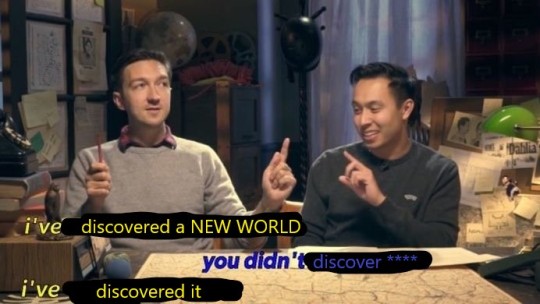
[ID: Two dots meme, edited so that Guy A says “i’ve discovered a NEW WORLD,” Guy B replies “you didn’t discover ****,” and Guy A insists “i’ve discovered it” / End ID.]
Now, I’ve mentioned this in passing, but the world of ATLA doesn’t appear to have had an Age of Exploration. There’s no vast “undiscovered” land masses, the four nations have always known about each other, and they all have a shared language.
The whole foundation for the Age of Imperialism was “oh, look, there are all these ‘unexplored’ lands with resources ripe for the picking (who cares about the indigenous people, they’re just simplistic savages who don’t know what’s best for them), let’s see which European country can grab the most land first.”
This was a race. This was sudden. This was Europeans coming in and taking over while viewing the natives as bothersome pests. This was about multiple major world powers competing over resources.
This was not 100 years of active warfare between a single conquering country and the very people they were trying to conquer.
The parallels don’t hold up.
Secondly, by focussing only on this one kind of historical narrative, we ignore any others.
I will admit that I have used the word “imperialism” in reference to the Fire Nation a time or two. However, upon further reflection, I realize I didn’t really mean imperialism, which is actually a fairly modern concept. What I feel the Fire Nation is really an example of is centralism and expansionism-- two ideaologies that have been a way of life for conquering empires throughout history.
(I am in no way qualified to explain the differences between these concepts-- I recommend doing your own research if you’re curious.)
The Persian Empire. The Greek Empire. The Roman Empire. The Byzantine Empire. The Mongolian Empire. The Russian Empire. The First French Empire.
You could take any of these (or numerous others) and make an interesting analysis between the similarities and differences between their behaviors and that of the Fire Nation. And maybe I’ll do that someday.
However, I started this to talk about Yu Dao and all of the other so-called colonies (I really feel like territories would be a better word, but, again, that’s a whole ’nother discussion), and I’d like to focus on that.
FYI, here’s a basic history refresher: If two countries are at war, and then they decide to end the war, neither country is required to return captured territories. They can make a treaty and agree to do so, but there is no obligation to. The Fire Nation didn’t just march in and say, “this is our land now”-- they fought for it. They captured that land. Just because the war is over doesn’t mean they need to just give it back.
Like it or not, that is the way the world operated for thousands of years, and so that is the interpretation I’m working with here.
In any case, “The Promise” actually presents this as a three-way conversation. There’s Zuko (and, by default, the Fire Nation), Kuei (and, by default, Ba Sing Se and the Earth Kingdom), and the people of Yu Dao themselves.
(My understanding of the Earth Kingdom’s style of government is that it’s made up of a large collection of different ethno-cultural regions who all answer to Ba Sing Se.)
I’ll let Sokka explain it:

[ID: Comic panel from Part Three of “The Promise.” Sokka and Katara are talking, both in obvious states of agitation, while Suki and Toph are looking at something in the background. Sokka is saying, “Let me see if I got this. The protestors and the Earth Kingdom Army want the colonials to go, the Fire Nation Army wants the colonials to stay, and the Yu Dao Resistance just want their city to be left alone?” Katara responds, “Yes!” / End ID.]
The people of Yu Dao don’t care about the war. They don’t even really care who’s in charge. They just want to be left alone.
This speaks to me on a very personal level, so I’m going to make another real-world comparison here:
My ancestors first came to America to escape from the poverty and opression they were experiencing in a place known as “White Russia”-- that is, Belarus. To be clear, I am not talking about the country “Belarus,” but the region, which includes the modern-day countries of Lithuania, Ukraine, Belarus, Latvia and Moldova, as well as parts of Poland and Russia.
I looked up White Russia, trying to find out how much information someone who didn’t grow up hearing stories about what it was like (that is, most of the people reading this,) might have. I didn’t find much. Most of what I found talked about political ideologies and such-- things that your average poor peasant, struggling just eke out a living, didn’t have much energy to care about. So let me paint a(n oversimplified) picture for you.
Imagine you’re a poor shoemaker in a small town on the Russian border. You spend your days hard at work, trying to earn a living to support your wife and nine children. You’ve never left the town you were born in. One day you get the news: Russia and Poland are fighting again. Your two oldest sons (ages 15 and 17) are forcibly drafted off to fight in the Russian army; you never see them again and have no way of knowing if they’re dead or alive (they’re probably dead). Poland wins-- this time. Congratulations, your town is now part of Poland.
Does suddenly being Polish make a difference to your life? Not in the slightest. Two or three years down the line, you’ll go back to being part of Russia again. This is the third or fourth time you’ve seen your town switch hands, and you can’t say you prefer one government over the other. It doesn’t really matter who’s in charge-- you’re still faced with crippling taxes, forced drafts, and various other forms of oppression. (It doesn’t help that you happen to be part of a persecuted minority.)
(This is why I have many ancestors who may never have left the town they were born in, and yet records show that they were born in one country, got married in another, and died in a third.)
This is the kind of worldview through which I am looking at Yu Dao. (Obviously, it’s not an exact parallel, but neither is the standard “colonizers vs oppressed natives” lens.)
My ancestors eventually got fed up with the treatment they were receiving from their respective governments, and left to build a new life, in a new place. But the citizens of Yu Dao don’t have anywhere to go. The only two real world powers in this story are the Fire Nation and the Earth Kingdom, neither of which has ever before expressed any true interest or concern in the actual people of Yu Dao.
The Earth Kingdom didn’t really care about the city before the war-- they were just another poor, struggling town, whose citizens were barely able to make ends meet. And while the Fire Nation may have helped the place grow into a bustling town, they also established a hierarchy that did not serve in the citizens’ best interests.
And so, in “The Promise,” these citizens’ frustrations come to a head. “Enough,” they say, “we don’t want to be used as a pawn in your games anymore.”
And Zuko and Kuei (and Aang) actually listen. They say “we need to start thinking about these people as people, not as symbols of one side or the other. It’s time to give them a say in their future.”
And a new country-- a new way of life-- is born.
(Is it perfect? Absolutely not. But it is constantly evolving and changing, trying to do better, be better. And that’s more than you can say about most of the other countries in this world.)
#avatar the last airbender#avatar comics#the promise#meta#yu dao#fire lord zuko#fire nation#earth king kuei#earth kingdom#colonization#history lesson#imperialism#expansionism#centralism#real-world parallels#united republic of nations#thoughts#this is just my take#alternate opinions are valid#food for thought
87 notes
·
View notes
Text
Identity and Reality
This morning I picked up a book from my philosophy student days, “Identity and Reality,” by Emile Meyerson. It’s a book about the metaphysical foundations of science, but the title inspired me.
Everyone has an identity in the sense of their answer to the question “what are you?” Almost everyone has a need to find, adopt, or construct an answer. Often it’s a list of things: a mother, a Jew, a football fan, a plumber, and so on. Recently “gender identity” has been added.
There is no national identity with a longer pedigree than that of the Jewish people. For millennia Jews have had a unique language and religion, and a tradition that connects them to the Land of Israel, which (according to that tradition) was given to them by Hashem. Religious Jews explicitly remind themselves of this three times a day.
This makes “Jewish” a very desirable identity. As Jimmy Durante said (about something else), “everybody wants to get into the act,” despite the anti-Jewish attitudes that Jews have to deal with. Jewish identity is so sought-after, that one of the popular themes of antisemites is to claim that they are the “real Jews” and we are Khazars or just fakers. If a Jew chooses to live in the Land of Israel, they have additional prejudices against them. Recently a European “anti-fascist” said that as an Israeli Jew, I was “stealing the very air I breathe.”
But still, the Jewish identity is attractive because – here is the connection to the book I picked up – it is solidly grounded in reality. Lots of people hate Jews and even want to kill them, but no identity is better documented. Indeed, one of the most important parts of the cognitive warfare that is being waged against the Jewish people by its enemies is the effort to break down that identity; in particular, to disconnect us from the Land of Israel. So, for example, Palestinian Arabs go out of their way to destroy archaeological evidence of ancient Jewish provenance in the land, as they have done at the Temple Mount and numerous other sites.
Mahmoud Abbas has always insisted that “Jewish” refers only to a religion, not to a people, because a people can have ties to a particular land, and if there were a Jewish people, this would be their land. This is why he objected so strongly to the condition that he recognize Israel as the state of the Jewish people, although he claims to recognize Israel’s existence. This is why the PLO has never agreed to the formulation “two states for two peoples,” although it claims to support a “two state solution.”
Tribal identities are important to Arabs, but attempts to forge a pan-Arab identity among Arabic speakers haven’t been particularly successful, because, for example, North Africans, Egyptians, and Syrians have little in common. A great deal of energy is put into the attempt to establish that there is a historical “Palestinian” identity, but the people who identify as “Palestinians” today have diverse origins, with many of them relatively recent (after 1830) migrants to the area. There is very little that is specifically Palestinian in their culture (as opposed to tribal, Arab, or Muslim), other than elements that developed in opposition to Israel. They didn’t even self-identify as “Palestinian” until the 1960s. That is not to say that there cannot be a “Palestinian people” – give them another 3000 years, and if they still remember the Nakba, they may become as well-established as the Jewish people.
The Palestinian argument is that we, the Jews, appeared from Europe in the 20th century and “colonized” a long-established indigenous “Palestinian people,” ultimately taking their land by force, driving most of them out of their homes and not allowing them to return. The Jews, according to this story, are not even a people, just a bunch of Europeans whose made-up religious myth connects them to what is actually the Palestinians’ homeland (I am not sure how they account for the more than 50% of Israelis who previously lived in various Arab countries).
Like all “Europeans,” the story continues, the Jews are white racists who exploit black and brown indigenous peoples like the Palestinians. Justice therefore requires that the Jews should give up control of the land to its “rightful owners,” the millions of descendants of the Arab refugees of 1948.
The Palestinian story is wildly wrong on several points. First, there were several ancient Jewish commonwealths in the Land of Israel, and some Jews always were present during the millennia in which the land was under the control of various outside powers. Doubtless some of today’s Palestinians are also descended from ancient residents of the land, but the great bulk of Palestinian families arrived much later. So the claim that Arabs are “more indigenous” than Jews is false. Arab families with names like “al Musri” (Egyptian) or “al Haurani” (Syrian) and numerous others testify to their origins.
Second, when the Zionists arrived and began developing what would become the Jewish state, it was not in the possession of the Palestinian Arabs – there was never a sovereign Palestinian entity in the land – but was a colony of the Ottoman Empire. Most private land belonged to absentee owners. Shortly thereafter the British Mandate was established, and the Arabs, led by Amin al-Husseini, who later cast his lot with Hitler, violently tried to prevent the advent of Jewish sovereignty. When the British were forced out, the Jews defeated the Palestinian Arabs and the Arab nations that invaded (who were interested in grabbing territory and kicking the Jews out, not in setting up a Palestinian state). The Jews did not “colonize” Palestine – they decolonized it, by ejecting the British.
Third, by the time the British left and the Arab nations invaded, the Palestinian Arabs had been fighting with the Jews for several months (with the connivance of the British, who preferred that the land come under Arab control). Much of the Arab elite fled early in order to avoid the conflict (some went to summer homes in Lebanon). The poorer Arabs fled for various reasons, including fear induced by propaganda about Jewish atrocities – which was not difficult for them to believe, since their own leaders planned to do the same to the Jews if they got the upper hand. Some Arabs were expelled (Lod or Lydda) because their towns or villages fought on the side of the Arab armies. Some 500-700 thousand Arabs left for various reasons, but there was no overall plan to expel them. In some cases (Haifa) Jewish authorities asked non-belligerent Arabs to stay.
After the war, only a few were allowed to return. The new state simply could not take the risk of allowing hostile Arabs to return and reignite the war. This was a classic ethnic conflict over land, and the usual result of these is either that the weaker side becomes refugees, or the winner massacres the losers. The leaders of the Arab nations did not hide their intention to massacre the Jews if they won. The 800,000 Jews kicked out of Arab countries at about the same time suffered a similar fate to the Palestinian Arabs.
Fourth, and finally, the whole “racism” theme is nonsense. Only a minority of Israelis ever lived in Europe. They range in color from black Ethiopians to white Europeans with red hair and freckles. Most are various shades of brown, as are Palestinians, who also include the descendants of black slaves and – if you remember her – Ahed Tamimi, who earned the nickname “Shirley Temper” for kicking and hitting Israeli soldiers, with her pale skin and blonde hair. The conflict is best described as national and religious, not racial.
But unlike other similar conflicts, the losers managed to persuade the world of the justice of their cause, with the help of the Soviet KGB, the Arab oil weapon, the liberal application of terrorism, and the exploitation of the always-present antisemitism of the west. Which is why my European anti-fascist acquaintance thinks I’m an oxygen bandit.
Abu Yehuda
16 notes
·
View notes
Text
BioShock’s Soundtrack Timeline Quirks and Hiccups
Here’s a question customers have posed while shopping around in this record store: “Is the BioShock soundtrack historically accurate?”
The short answer is no. This is of course including a presumption of a distinct cutoff year. If on the other hand, you would consider the reverse, “Is the BioShock soundtrack historically appropriate?”, well we shall see.
So let’s briefly break down the soundtrack of each game.
-
In the first Bioshock, the game opens with the year 1960 before taking us down to the underwater city of Rapture. However, Andrew Ryan had cut off contact with the Surface some time before, coupled with the Rapture Civil War officially starting on New Year’s Day in 1959. Granted several songs in BioShock were recorded in that last decade through the 50s including “Danny Boy” (1952), “Papa Loves Mambo” (1954), “It’s Bad for Me” (1955) and so on.
Frank Fontaine’s smuggling operations could account for the fact of the very late 1959 release dates of Bobby Darin’s “Beyond the Sea” and Noël Coward’s “20th Century Blues”, however Fontaine allegedly died in September 1958 according to the newspaper article in the Rapture Standard.
Even with Fontaine’s shenanigans, it doesn’t account for the 1966 version of Patti Page’s “Doggie in the Window” or the 2004 version of Cole Porter’s “You’re the Top” as seen below. Other songs include the assorted instrumental tracks recorded in the 1990s such as “The Ballroom Waltz”, “And All the While I’m Loving You” or even the 1966 song “Academy Award”. Lastly, there is still the mystery of the numerous instrumental guitar and violin songs supposedly performed or inspired by Django Reinhardt used in BioShock.
Creative Director Ken Levine obliquely mentioned the problem of using re-recordings and alternate versions of songs in a 2007 interview with Electronic Gaming Monthly.
...Or I would research on Wikipedia or talk to my dad, and then I would go and listen to little snippets, and I'd ask myself, "Does this feel like it belongs in Rapture?" [Dealing with this era of] licensed music... is a very complicated process, because generally you're dealing with people who are dead and their lawyers are dead. The rights are often very complicated, and so a lot of times we'd want a song and we wouldn't get it. We'd have to find another person who performed it, or another version of the recording or something like that. We had to be fairly flexible.
-
Overall, BioShock 2 does have the most historically accurate soundtrack of the series, excluding the songs reprised from the first BioShock. The game ostensibly takes place in 1968, or 10 years later from 1958 according to the opening titles.
All things considered, its only soundtrack transgression is using the 1976 version of “Daddy’s Little Girl” as seen below.
Aside from that, its newest songs unique to the game are 1945′s “Dream” and “It’s Only a Paper Moon”. Many songs trend older towards the 1920s and 1930s, reflecting the older portions of Rapture seen in the game with some of the oldest tracks being 1929′s “Daddy Won’t You Please Come Home” and “Nobody Knows You When You’re Down and Out”.
-
BioShock Infinite and the floating city of Columbia introduces time as central plot point and with it some interesting soundtrack implications. Keeping in mind the setting is 1912, its soundtrack can be broadly divided into three categories
Modern covers of existing period songs were recorded especially for the game such as “After You’ve Gone”, “Will the Circle Be Unbroken”, and the Scott Joplin rags.
Deliberately anachronistic songs are provided as a plot point courtesy of Messrs. Albert Fink and Scott Bradlee rearranging modern songs to sound period such as “Girls Just Want to Have Fun”, “Fortunate Son”, “Tainted Love” and so on.
Lastly there are the period songs meant to evoke the flavor of the 1912 setting. While some are authentically of the era including some very old Edison cylinders, quite a few bleed into the 1920s and 30s including “Ain’t She Sweet” (1927), “Button Up Your Overcoat” (1929), and “St. James Infirmary” (1930). Bessie Smith manages to crossover to both cities in both BioShock Infinite and BioShock 2 with “I’m Wild About That Thing”, “Nobody Knows You When You’re Down and Out”, and “Need a Little Sugar in My Bowl”. In addition, several recordings are presented “live” in the game, but were recorded much later such as the prison work song recorded by Alan Lomax, “Black Gal” in 1959 and “Shake Sugaree” recorded in 1967.
Lastly, Burial at Sea features a coda. Both Patsy Cline songs “She’s Got You” and “Back in Baby’s Arms” were recorded in the 1960s, well after the 1959 date of the events of the game. However in a tragic twist of fate, she would die shortly after recording the songs in a plane crash.
Creative Director Ken Levine again mentioned the problem of finding music “that sounds great to the modern ear” in a 2012 interview with Wired magazine.
But one of my favorite parts of my job is choosing the licensed music. BioShock Infinite is set in an interesting time because it’s right at the beginning of jazz and blues. Music before jazz and blues is not very listenable. I mean popular music -– it’s really kind of awful. You know, the John Philip Sousa marches and stuff. And then you get jazz and blues coming in, with the early stuff like ragtime.
It’s much more challenging to find music from that era that sounds great to a modern ear. BioShock was set in 1959, so we had this huge slate of great music to choose from. But here we don’t have all the chord progressions, and the things we like didn’t exist or had just started to exist. So finding music has been a really interesting challenge...
The most important thing is that you get people to feel things. I’ll give you a hint: There weren’t flying cities in 1912 nor were there underwater cities and genetic technology in 1959 (laughs). So, yeah, you play a little fast and loose. You could argue that this is Columbia and we do things a little differently.
You’ve already heard some of the strange musical things in the game...
-
Less discerning record customers may have grabbed the wrong discs and are surprised to find the recordings don’t match what they’ve heard.
I have taken the liberty of conducting a synchronization of a number of the more unusual re-recordings which the games use instead of the originals. These are presented in the new stereophonic sound format, be advised it is recommended to have two speakers far apart to get the full effect, or at the very least avoid having two speakers that are too close together.
The original older track is on the listener’s left while the newer one used in the games are on the listener’s right.
Some of the more fantastically-minded among us down here in Rapture might be tempted to simply blame the above on those newfangled Tears. But it is the records that speak for themselves.
youtube
Patti Page’s “The Doggie in the Window”
1952 Mercury Records version (original)
1966 Columbia Records version (used in BioShock)
youtube
Cole Porter’s “You’re the Top”
1934 Victor Records version (original)
2004 version with Vince Giordano and The Nighthawks (used in BioShock)
youtube
Mills Brothers’ “Daddy’s Little Girl”
1950 Decca Records version (original)
1976 Ranwood Records version (used in BioShock 2)
The original versions of the songs are featured occasionally here with the addendum that they were not actually used in the game. They are marked with the RRR for Rapture Records Recommendation.
There are number of other instances where an artist recorded more than one version of a song, typically well before, such as Noël Coward’s 1959 “Party’s Over Now” and his slightly longer 1932 version. But that’s left for another revolution of the record.
60 notes
·
View notes